|
|

out & about
mosses from an old manse
Peter Culley
_______________________
Threads Talk Series
...curated by Steve Clay and Kyle Schlesinger, is devoted to the art of the book featuring poets, scholars, artists, and publishers. The objective for the series is to build on the discourse within book arts to explore and enrich relationships between various strands of book culture that are often approached in isolation, for example poetry and writing, visual and performing arts, collaboration, design, printing, independent publishing, literary history, critical theory, and material culture to name a few. The talks were recorded before a small studio audience and are available for public consumption here on PennSound. Eventually the series will be collected and published in book form.
"From the Voice to the Book, from the Book to the Voice: a Dialectic" [mp3] Jerome Rothenberg, May 7, 2010
Jerome Rothenberg blogs at
Poems and Poetics
_______________________
Will the Book Survive Generation Text?
Carlin Romano
Chronicle Review
My own peculiar worry about Academe 2020, offered with less than 20/20 foresight, may seem less catastrophic: the death of the book as object of study, the disappearance of "whole" books as assigned reading. Does that count as a preposterous figment of extreme academe, or is it closer than we think?
I don't mean the already overwrought debate over the crisis of the book as codex—the daily New York Times announcement that electronic readers stand primed to eliminate paper books. (This shift, of course, plays into the problem, since any shrewd publishing type can see how the paper book's demise might make it easier to digitally trim, abridge, and repackage texts in more "appealing" forms than their benighted authors envisaged.) The issue isn't the decline in book sales, though it, too, remains an element of the big picture. I am talking about the growing feeling among humanities professors—intuitive and anecdotal, shared over lunch like an embarrassing tale about a colleague—that for too many of today's undergraduates, reading a whole book, from A to Z, feels like a marathon unfairly imposed on a jogger....(more)
_______________________
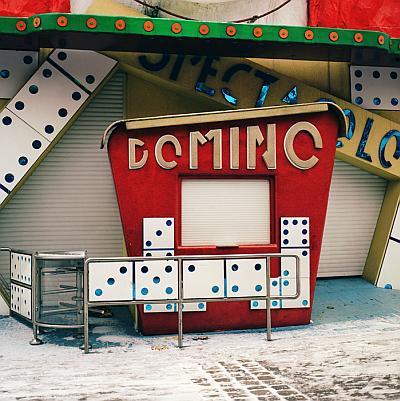
Endstation Sehnsucht
Frank Robert
_______________________
Ashbery’s Eccentric
John Latta
(....)Ashbery’s essay is about the German “eccentric” Max Klinger “(born 1857 in Leipzig; died 1920 at Grossjena, near Naumburg)”—one of the few artists de Chirico included in what Ashbery (“Metaphysics makes strange bedfellows”) calls “the bizarre cenacle” to whom he (de Chirico) “paid written homage” (others being Raphael, Courbet, and Böcklin). (One’s remind’d of Ashbery’s own cénacle—and love of eccentrics—the various and singular ones he call’d in Other Traditions“a poetic jump-start for times when the batteries have run down”— John Clare, Thomas Lovell Beddoes, Raymond Roussel, John Wheelwright, Laura Riding, and David Schubert. Ashbery quotes, too, de Chirico’s prose homage to Klinger:
What is this romanticism of modern life? . . . It is the breath of yearning that flows over the capitals of cities, over the geometry of suburban factories, over the apartment houses that rise like cement or stone cubes, over the sea of houses and buildings, compressing within their hard flanks the sorrows and hopes of insipid daily life. It is the pretentious private residence in the breathless torpor of a springtime morning or the moonlit calm of a summer night, with all the shutters closed behind the garden trees and the wrought-iron gates. It is the nostalgia of railroad stations, of arrivals and departures, the anxiety of seaports where ships, their hawsers loosened, sail into the black waters of the night, their lights aglitter as in cities on a holiday.
Which sounds a little like some of Ashbery’s prose in Three Poems, with its own considerations of yearning and pretence, and the force of quotidian residual nostalgia intrudes (gorgeously)....(more)
_______________________
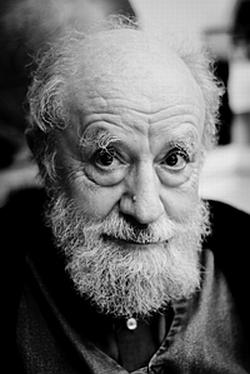
Michel Butor
b. September 14, 1926
Repair / Michel Butor
translated by Michael Benedikt
Aspen no. 5+6
(....)
along shores covered with dark green trees
resection white cauterization
I was rowing
I sleep
I wasn't alone
y c kneecap
in a flimsy canoe
wound
and we glided in tranquility upon the waters
a drop of honey grey cicatrization
while frightening the wild ducks and otters
I sail on
amid fragrances of pine-needles
perforation d femur
and there was in the sky a star named the sun
rip
which descended very gently among the peaks
x violet rotation
and amid the reeds onto the sand
I swim
some lively lizards and gentle turtles too
a drop of oil e sternum
slight
soldering
a little
innoculation indigo ventilation
just a little more
I'm dropping
off a little more still
w
...(more)
Portrait of the artist as a young ape: a caprice
Michel Butor translated by Dominic DiBernardi google books_______________________
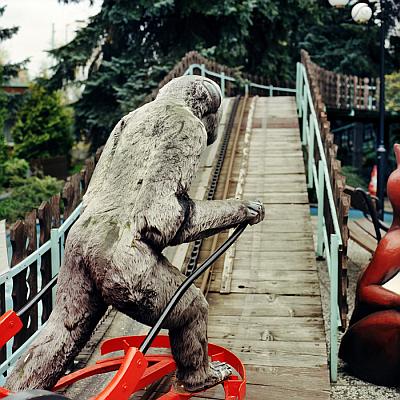
Endstation Sehnsucht
Frank Robert
_______________________
Leviathan
George Oppen
Truth also is the pursuit of it:
Like happiness, and it will not stand.
Even the verse begins to eat away
In the acid. Pursuit, pursuit;
A wind moves a little,
Moving in a circle, very cold.
How shall we say?
In ordinary discourse—
We must talk now. I am no longer sure of the words,
The clockwork of the world. What is inexplicable
Is the ‘preponderance of objects.’ The sky lights
Daily with that predominance
And we have become the present.
We must talk now. Fear
Is fear. But we abandon one another.
The Mind’s Own PlaceGeorge Oppen
(1963)
(....)Bertolt Brecht once wrote that there are times when it can be almost a crime to write of trees. I happen to think that the statement is valid as he meant it. There are situations which cannot honorably be met by art, and surely no one need fiddle precisely at the moment that the house next door is burning. If one goes on to imagine a direct call for help, then surely to refuse it would be a kind of treason to one’s neighbors. Or so I think. But the bad fiddling could hardly help, and similarly the question can only be whether one intends, at a given time, to write poetry or not.
It happens, though, that Brecht’s statement cannot be taken literally. There is no crisis in which political poets and orators may not speak of trees, though it is more common for them, in this symbolic usage, to speak of “flowers.” “We want bread and roses”: “Let a thousand flowers bloom” on the left: on the right, the photograph once famous in Germany of Handsome Adolph sniffing the rose. Flowers stand for simple and undefined human happiness and are frequently mentioned in all political circles. The actually forbidden word Brecht, of course, could not write. It would be something like aesthetic. But the definition of the good life is necessarily an aesthetic definition, and the mere fact of democracy has not formulated it, nor, if it is achieved, will the mere fact of an extension of democracy, though I do not mean of course that restriction would do better. Suffering can be recognized; to argue its definition is an evasion, a contemptible thing. But the good life, the thing wanted for its elf, the aesthetic, will be defined outside of anybody’s politics, or defined wrongly. William Stafford ends a poem titled “Vocation” (he is speaking of the poet’s vocation) with the line: “Your job is to find what the world is trying to be.” And though it may be presumptuous in a man elected to nothing at all, the poet does undertake just about that, certainly nothing less, and the younger poets’ judgment of society is, in the words of Robert Duncan, “I mean, of course, that happiness itself is a forest in which we are bewildered, turn wild, or dwell like Robin Hood, outlawed and at home.”
It is possible that a world without art is simply and flatly uninhabitable, and the poet’s business is not to use verse as an advanced form of rhetoric, nor to seek to give to political statements the aura of eternal truth. It should not really be the ambition even of the most well-meaning of political and semipolitical gatherings to do so, and to use verse for the purpose, as everyone perfectly well knows, is merely excruciating. Therefore the poet, speaking as a poet, declares his political nonavailability as clearly as the classic pronouncement: “If nominated I will run: if elected I will hide” (I quote from memory). Surely what we need is a “redemption of the will”—the phrase from a not-yet-produced young playwright whose work I have read—and indeed we will not last very long if we do not get it. But what we must have now, the political thing we must have, is a peace. And a peace is made by a peace treaty. And we have seen peace treaties before; we know what they are. This one will be, if we get it, if we survive, like those before it, a cynical and brutal division of the world between the great powers. Everyone knows what must be in that document: the language of both sides has been euphemistic but clear. A free hand in Eastern Europe to Russia: to the United States in Western Europe and in this continent and some other places. And the hope that China will not soon acquire a bomb. And where is the poet who will write that she opened her front door, having sent the children to school, and felt the fresh authentic air in her face and wanted—that?...(more)
_______________________
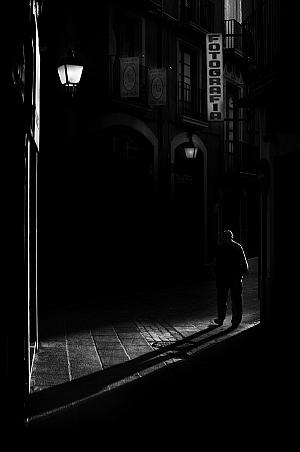
Manresa, Carrer d'Urgell
enantiodromia
street photography in progress
Martkn Molinero
_______________________
Do Not Pity the Democrats
Chris Hedges
There are no longer any major institutions in American society, including the press, the educational system, the financial sector, labor unions, the arts, religious institutions and our dysfunctional political parties, which can be considered democratic. The intent, design and function of these institutions, controlled by corporate money, are to bolster the hierarchical and anti-democratic power of the corporate state. These institutions, often mouthing liberal values, abet and perpetuate mounting inequality. They operate increasingly in secrecy. They ignore suffering or sacrifice human lives for profit. They control and manipulate all levers of power and mass communication. They have muzzled the voices and concerns of citizens. They use entertainment, celebrity gossip and emotionally laden public-relations lies to seduce us into believing in a Disneyworld fantasy of democracy.
The menace we face does not come from the insane wing of the Republican Party, which may make huge inroads in the coming elections, but the institutions tasked with protecting democratic participation. Do not fear Glenn Beck or Sarah Palin. Do not fear the tea party movement, the birthers, the legions of conspiracy theorists or the militias. Fear the underlying corporate power structure, which no one, from Barack Obama to the right-wing nut cases who pollute the airwaves, can alter. If the hegemony of the corporate state is not soon broken we will descend into a technologically enhanced age of barbarism. ...(more)
_______________________
The scream of geometry
Andrzej Tichy
Translation by Linda Rugg and Andrzej Tichy
eurozine
(....)
In the car. Passing innumerable signs, cities, villages, and waterways of different sizes, figures indicating the number of kilometres, decreasing: 607, 580, 417, 356, 224, 145, 82. Then a new objective, and it starts all over again: 589, 412 and on and on. How far have you travelled? How many kilometres, metres, how many deci-, centi-, millimetres? Somehow it surprises you that there is no end to it. How can it just go on and on, every place completely independent of the others but still connected in some way? How can these cities, villages, and their people exist? How can they stand there selling tomatoes and speaking their language and drying their laundry without considering the infinite number of other places where someone else is standing, selling tomatoes or potatoes and speaking their language and drying laundry? They go to work, fix their engines, prescribe medication, mop their tiles; they save their money and walk their dogs. They apply salve to their elbows, they cast glances at their TV screens, they wash plates, knives, and forks; they feed cats and cook coffee, they call the plumber and trudge all the way to the post office in spite of the rain, the hail, the snow. They read newspapers and look through phone books, their children address them with reverence or disrespect, their parents advise them and forbid them to watch violence and sex on TV or to stay out past a certain hour. They have sisters, brothers, mothers, fathers, wives, husbands, lovers, mistresses, enemies, colleagues, supervisors, dealers, editors, maids, slaves. They are victims and perpetrators, they testify and get prosecuted, they spend time in prison and they serve in the army. They suffer from diseases, they lie awake in their beds and sweat, they take a shower or a bath in the morning or at night, they brush their teeth every day. They write notes, letters, poems, dissertations, books, wills, reports, slogans, html codes, protest lists, programmes, sms, shopping lists, threatening letters. They record sound. They translate, comment, and criticize. They want to impress their audience. They have pencils and pens. They have typewriters, they dream of buying computers. They have desktops, they dream of buying laptops. They have laptops, they dream of GPS devices and future supercomputers. They hoist flags made up of cloth, coloured with red, blue, yellow, green, and black dye. They have small flags made of wood and paper that they stick into birthday cakes. They cover their skin with tattoos. They slash themselves, they scar. Their friends slander them and their co-workers suspect them. They consider themselves normal, they believe that every thing has its place, its time. They believe that one should keep quiet if one has nothing to say. They don't believe that there is anything more to say. They chew. They eat vegetables, fish, pork, beef, lamb, sheep, chicken, and fruit. They watch the animal ruminate. They play soccer, hockey, volleyball, gin rummy. They go on holiday and fantasize about honour and wealth, freedom and equality. They know what courage means. They try to remember phone numbers. They try to avoid forgetting door codes, PIN codes, social security numbers, TAN codes, bar codes, ISO codes. They go to baptisms, weddings, funerals, demonstrations, markets, birthday parties, concerts, parades, shows, and theatrical performances. They go for walks. They get intoxicated. They buy and sell hash, weed, amphetamines, ecstasy, PCP, meth, crack, ketamine, cocaine, rohypnol, fentanyl, subutex. They sit on staircases, sweating, and freeze at bus stops, they sit on trains, in cars, in aeroplanes, thinking that tomorrow will come, and that is the reason they keep going, because they believe that time exists and that it exists for them and for them only. And at the same time, while all this is taking place, all the time, just then, that place, the lavatory that you used, it still exists, even though you are far away, even though you will never ever return to those caustic piss fumes, never again and yet, always, continuously, unendingly, perpetually, eternally. You will always remain there, you will never get out, you will be both here and there. And on every other point between these points. Every point is closed, every point is fixed. The lines connecting the points always consist of an infinite number of closed, fixed points and the lines between these points always consist of an infinite number of points, and the lines between these of an infinite number of points and even more lines. You will be everywhere. So what is the purpose of this journey? If nothing changes, if everything is the same when you get there, because nothing ever changes, if time is as fixed as the asphalt under the tyres of this car? If it is the same tomatoes and the same clothes, but in different languages and in different colours. You see the roof of the white Mercedes, and the freeway with its allegedly infinite lines, the surrounding fields, and all these ant-like creatures performing this or that act just as the rest of the world performs this or that act, ceaselessly, repeatedly. Everything is out there, undeniably, completely independent of you and the other separate parts, independent of the separate human beings, scalding their milk and all that, and it is like a huge, eternal riddle, at least partially accessible to you and your weak mind. ...(more)
_______________________
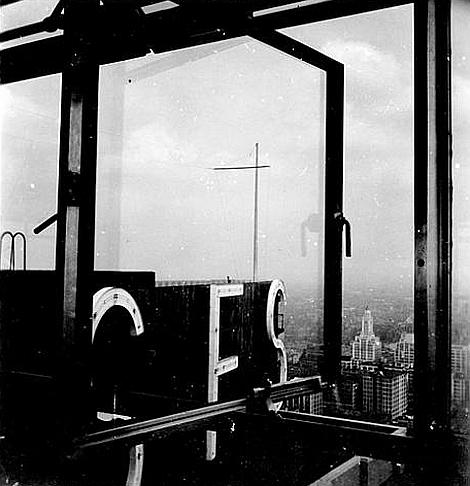
The Open Window
Philadelphia
1939
John Gutmann
(1905-1998)
1 2 3
_______________________
from
Alpine
George Oppen
We were hiding
Somewhere in the Alps
In a barn among animals. We knew
Our daughter should not know
We were there. It was cold
Was the point of the dream
And the snow was falling
Which must be an old dream of families
Dispersing into adulthood
And the will cowers
In the given
The outlaw winds
That move within barns
Intolerable breeze
A public music
Seeps thru the legendary walls
The cracked inner sides
The distinctions of what one does
And what is done to him blurrs [sic]
Bodies dream selves
For themselves
From the substance
Of the cold
Yet we move
Are moving
Are we not
Do we hear the heaving moving
Of the past in barns
The Textual Dilemma of Oppen's Alpine
Brad N. Haas
flashpoint
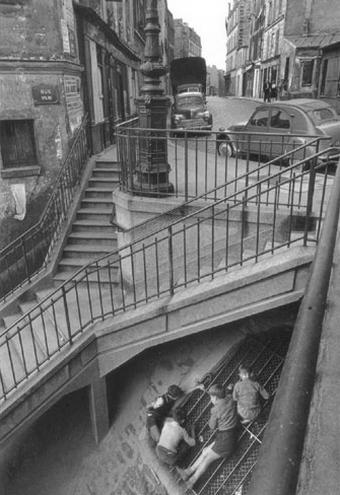 Belleville
Willy Ronis
1959
_______________________
Meditation on a Thought of Antin's (Second Hand)
Bill Lavender
(....)
but in the wood itself
purged for the oldest of reasons
like a scribe
assigned by the king to encode
the secret documents
the library the maps to the treasure
as to be unintelligible to their enemies
who, as anticipated, storm the castle that night
and kill of course first the defenseless scribe
and throw his body on the fire with the key still in his
pocket and they take the encrypted library
make it the basis of their science
build on it, add to it for two thousand years
a problem with
i n t e r p r e t a t i o n
an interpenetration of codes
guides by vanities
the meaningless milked
for every drop while the meaning
melted on the fire
hermeneutics, in other words
in
other
words
what might once have been called
words
& i have no desire to return
to a discourse that forces force by habit
the clacking of word on word each
a call to battle
no matter the meaning
though like these line breaks
and funny
spacings (so hard to under
stand) which, formally or utterly,
breaks a bond and strikes no blow
...(more)
Bill Lavender 1 2 3
_______________________
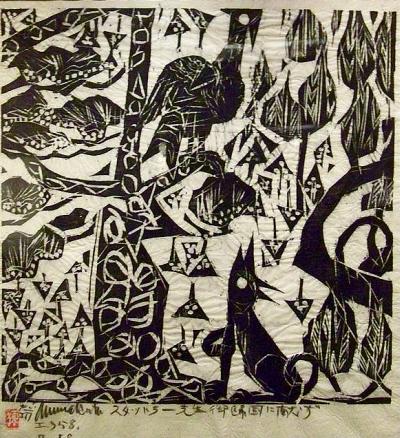
Shiko Munakata
d. September 13, 1975
photo by Alfred Stark
flickr
_______________________
from “Notes from Irrelevance” [pdf]
Anselm Berrigan
(....)
....Solidarity has
been less than a myth in
our future imagination
I fear without reason or
its inbred resemblance
to active policing of
our collective desire
to be just free enough
to dull necessity.
(....)
And yet I do not trust
the sanity of my vessel,
nor that of metaphor,
built across time to be
diminished by speed’s
freezing of the body in
place, as like or so being
near to and no less
against while with and
in relation to being seen,
everywhere, or, more
precisely, anywhere.
The hope of a plurality
of recognition guides
us into, back into, our
common de?nition of
caring, if not cares. ...
Peacock Online Review
via fait accompli
_______________________
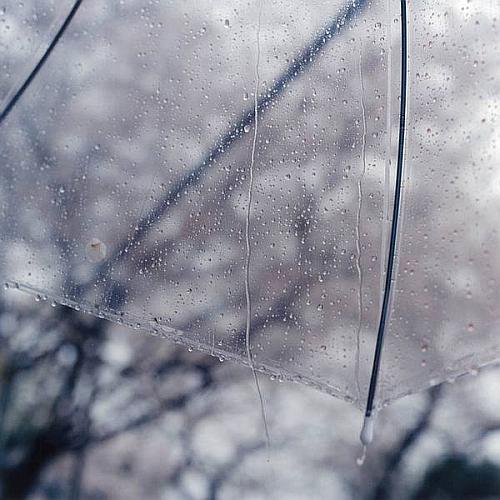
A Glimmer in Silence
Rinko Kawauchi
Galerie Priska Pasquer
1 2 3 4
via gmtPlus9 (-15)
_______________________
The Animal is Silent
Dylan Trigg looks at Alice Kuzniar's Melancholia's Dog: Reflections on Our Animal Kinship
The pressing question, and one that Alice Kuzniar asks in her outstanding book on the topic, is: Whose sadness is at stake in the animal’s uncanny silence? Whose yearning takes place in the void between animal and human? Asking this question, the human becomes detached, and so alienation and philosophy ensue, the products of what Max Scheler calls “spirit.” Distance, detachment: the world as world, but also as other. In turn, human life ceases to be a member of this planet in the solar system. For the human, the otherness of the animal, with its silent vigilance over the world, becomes the Heideggerian void, a boundary from which no two ontologies can occupy the same time and space. The animal’s silence is conceived in the human’s spirit, a silence that is as much metaphysical as it is from the voice of the animal itself....(more)
_______________________
I’ll Google It!: How Collective Wisdom in Search Engines Alters the Rhetorical Canons
Jill M. Parrott
When seeking information for the development of informed argument—a process known as invention, the first of the rhetorical canons—often the first action we take is to “Google it.” Yet, because Google’s mathematical algorithms decide the arrangement of search results, Internet users do more than “use” Google: they create it. With Google’s search structure, users actually participate in the construction of results. Therefore, Googling is not merely a receptive act but a collectively creative one as well. By exploring the implications of the rhetorical canons—invention, arrangement, style, memory, and delivery—in the search engine and its mechanizations, I argue that the search engine provides a unique opportunity for us to investigate the dynamic nature of the canons. Search engine users have expressed desire for more collective agency by investing time and energy into the rhetorical act of “Google bombing.” Consequently, I will discuss what happens to the canons when rhetorical artifacts are collaboratively rather than individually created. I will contend that we must recognize this “collective capability” as a rhetorical act, that we must explore this act through the lens of the canons, and that we must investigate our own roles as composers of these texts.
Present Tense: A Journal of Rhetoric in Society
_______________________
How America's Working Class Died on the Disco Dance Floor
Jefferson Cowie
.....................................................
.... according to the Central Intelligence Agency (whose patriotism I hesitate to question), income distribution in the United States is more unequal than in Guyana, Nicaragua, and Venezuela, and roughly on par with Uruguay, Argentina, and Ecuador. Income inequality is actually declining in Latin America even as it continues to increase in the United States. Economically speaking, the richest nation on earth is starting to resemble a banana republic. The main difference is that the United States is big enough to maintain geographic distance between the villa-dweller and the beggar.
- Timothy Noah
.....................................................
Fox Calls for Repeal of the 20th Century — 13 Achievements Conservatives Would Roll Back
_______________________
Ethics And Global Practice
Vol 3, No 3 (2010)
_______________________

Nuit au Chalet
1935
Willy Ronis
(August 14, 1910 - September 12, 2009)
_______________________
Error from Babel mutters in the places,
Cities apart, where now we word our failures:
Hatred and guilt have left us without language
that might have led to discourse
-
William Meredith, Effort at Speech
Effort at Speech: New and Selected Poems William Meredith google books
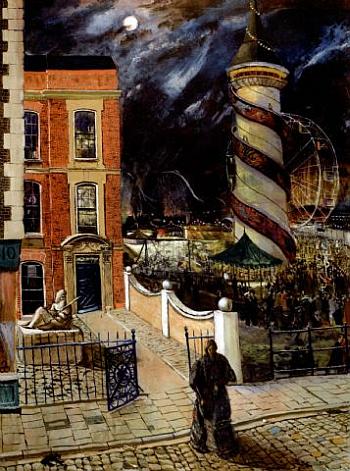
The fair
Carel Weight
b. September 10, 1908
_______________________
Stars Wheel in Purple
H. D.
Stars wheel in purple, yours is not so rare
as Hesperus, nor yet so great a star
as bright Aldeboran or Sirius,
nor yet the stained and brilliant one of War;
stars turn in purple, glorious to the sight;
yours is not gracious as the Pleiads are
nor as Orion's sapphires, luminous;
yet disenchanted, cold, imperious face,
when all the others blighted, reel and fall,
your star, steel-set, keeps lone and frigid tryst
to freighted ships, baffled in wind and blast.

H.D.
(born Hilda Doolittle, September 10, 1886
H.D. and Eurydice
Margaret Bruzelius
Twentieth Century Literature, Winter, 1998
. . . everything is at stake in the decision of the gaze.
-
Blanchot, "The Gaze of Orpheus"
(....)
..the story of Orpheus's gaze is not only the story of the mute female object passive before the male artist's gaze. It is also the story of the artist's dependence on that erotic other, the external subject that enables him to become the artist who is Orpheus. It is this redoubled doubleness that Blanchot expresses - the emptiness of Eurydice doubled by the emptiness of Orpheus, whose inspiration is possible only in a moment of complete self-forgetting:
If inspiration means that Orpheus fails and Eurydice is lost twice over . . . it also turns Orpheus towards that failure and that insignificance and coerces him, by an irresistible impulse, as though giving up failure were much more serious than giving up success.
(....)
...... to read H.D.'s "Eurydice" as prelude to the poet's later appropriations of the lost female voice of antiquity (or to ignore it as insufficiently "imagist") is to lose sight of its central location in a sequence of poems all of which address the significance of the gaze, the relation between the artist and her work, and the collapse of the distinction between subject and object. While Eurydice's situation exemplifies the impasse of the gaze in a gendered, zero-sum economy in which Orpheus's gain must necessarily come at her expense, it is not an isolated moment but part of an extended meditation on the relation of the artist to his object, not only the erotic object - Eurydice - but the aesthetic object - the artist's "work," in Blanchot's term. "Eurydice" is not only a moment of feminist rage that enables the later poems, it is also part of H.D.'s attempt to free herself from the constraints of a model of artistic inspiration dominated by the all-powerful possessive artistic gaze with its presumed masculine bias and its greedy appropriation of motivating power (figured as light in these poems) and its emphasis on the isolated duo of artist and model. "The God" articulates a series of moments in which the artist/lover is absolutely transcended by his double object - the erotic other and the aesthetic work - and becomes an object mastered by the "work," not an independent maker but a thing made. In this context, while "Eurydice" remains the expression of the agonizing "double bind" of the woman writer constrained to speak as object in a masculine-dominated visual economy, this anguished position paradoxically encompasses and reflects back on Orpheus, who is himself the object worked by the "god." In H.D., Orpheus stands condemned - not only in the "Eurydice" poem but also in the entire series The God - as one who has fundamentally misunderstood both his position and that of his artistic object in the order of art. He is not the source of the light that illuminates the object and allows the art to be made, but rather a thing himself illuminated by art....(more)
"Sparse and geometric contour": transformations of the body in H.D.'s 'Nights'
Miranda B. Hickman Twentieth Century Literature, Fall, 2001
Seaward: H.D.'s 'Helen in Egypt' as a response to Pound's 'Cantos.'
Jeffrey Twitchell-Waas
Twentieth Century Literature, Winter, 1998
H.D. and "The Contest": archaeology of a Sapphic gaze
Bret L. Keeling
Twentieth Century Literature, Summer, 1998
_______________________

Pool
Peredelkino, Russia
2009
Sasha Rudensky
_______________________
Photography and the Unconscious
The Construction of Pathology at the Fin de siccle
Temenuga Trifonova
ctheory
(....)
Earlier I suggested that the introduction of an 'external' mirror (the camera) had the effect of undermining the belief in an 'internal' mirror (the body as an image of the mind). I have to slightly modify my claim. By arresting movement, instantaneous photography revealed something dead, mechanical, automatic or unconscious at the very core of life (life=movement) thereby undermining the notion of a singular, absolutely self-present self that expresses or manifests itself fully and purposefully through its movements. Paradoxically, the discovery that the mind and the body are not absolutely co-expressible depended on reaffirming exactly the assumption that was being challenged in the first place: it was precisely because on some level the body continued to be thought of as an 'image' (or mirror) of the mind that it was now possible to conclude -- based on the photographic evidence of the body's automatism (the mechanical, the dead, or the automatic exposed through the arresting of supposedly purposeful, fully conscious movements) -- that the mind is not absolutely self-present either but rather inherently dual or even multiple. On the other hand, instantaneous photography's ability to arrest movement further undermined the previously assumed mirror relationship between mind and body: by arresting movement, instantaneous photography exposed every movement as made up of multiple meaningless, random, empty moments devoid of any significance outside of a sequence of uninterrupted movement. These autonomous instants failed to signify and were sometimes even 'guilty' of mis-signification. Whereas an uninterrupted movement could convey a body's exhaustion, for instance, the arresting of the body's uninterrupted movement produced a series of de-contextualized instants whose 'meaning' (the state of exhaustion they were supposed to express) could be easily misread as conveying, in fact, the opposite impression of energy: an individual instant could create the impression of an energetic body whose exhaustion became evident only when the whole movement unfolded uninterrupted. ...(more)
_______________________
Tribute To Freud
H. D.
originally published as "Writing on the Wall"
(....)
We had come together
in order to substantiate something. I did
not know what. There was something that
was beating in my brain; I do not say my
heart my brain. I wanted it to be let out.
I wanted to free myself of repetitive
thoughts and experiences niy own and
those of many of my contemporaries. I did
not specifically realize just what it was I
wanted, but I knew that I, like most of the
people I knew, in England, America and
on die Continent of Europe, were drifting.
We were drifting. Where? I did not know
but at least I accepted the fact that we 'were
drifting. At least, I knew this I would
(before the current of inevitable events
swept me right into the main stream and
so on to the cataract) stand aside, if I could
(if it were not already too late), and take
stock of my possessions. You might say
that I had yes, I had something that I spe-
cifically owned. I owned myself. I did not
really, of course. My family, my friends
and my circumstances owned me. But I
had something. Say it was a narrow birch-
bark canoe. The great forest of the un-
known, the supernormal or supernatural,
was all around and about us. With the cur-
rent gathering force, I could at least pull
in to the shallows before it was too late,
take stock of my very modest possessions
of mind and body, and ask the old Hermit
who lived on the edge of this vast domain
to talk to me, to tell me, if he would, how
best to steer my course.
...(more)
_______________________
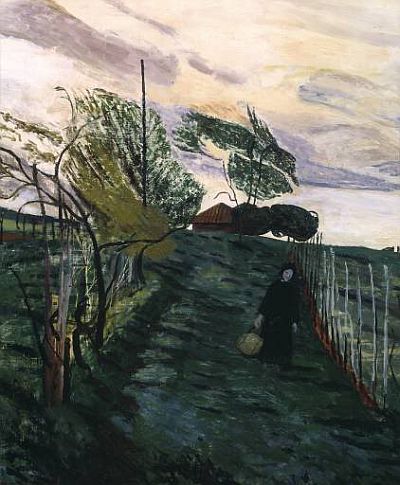
Sienese Landscape
Carel Weight
_______________________
Sheltered Garden
I have had enough.
I gasp for breath.
Every way ends, every road,
every foot-path leads at last
to the hill-crest--
then you retrace your steps,
or find the same slope on the other side,
precipitate.
I have had enough--
border-pinks, clove-pinks, wax-lilies,
herbs, sweet-cress.
O for some sharp swish of a branch--
there is no scent of resin
in this place,
no taste of bark, of coarse weeds,
aromatic, astringent--
only border on border of scented pinks.
Have you seen fruit under cover
that wanted light--
pears wadded in cloth,
protected from the frost,
melons, almost ripe,
smothered in straw?
Why not let the pears cling
to the empty branch?
All your coaxing will only make
a bitter fruit--
let them cling, ripen of themselves,
test their own worth,
nipped, shrivelled by the frost,
to fall at last but fair
With a russet coat.
Or the melon--
let it bleach yellow
in the winter light,
even tart to the taste--
it is better to taste of frost--
the exquisite frost--
than of wadding and of dead grass.
For this beauty,
beauty without strength,
chokes out life.
I want wind to break,
scatter these pink-stalks,
snap off their spiced heads,
fling them about with dead leaves--
spread the paths with twigs,
limbs broken off,
trail great pine branches,
hurled from some far wood
right across the melon-patch,
break pear and quince--
leave half-trees, torn, twisted
but showing the fight was valiant.
O to blot out this garden
to forget, to find a new beauty
in some terrible
wind-tortured place.
Selected Poetry of H. D.
Representative Poetry On-line
_______________________
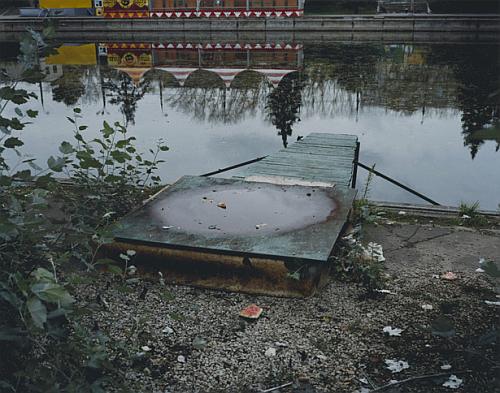
watermelon seeds
Sasha Rudensky
_______________________
Recognition, Vertigo, and Passionate Worldliness
The tribes of contemporary poetry.
Tony Hoagland
Here are two well-known descriptions of what a poem is, and does, one by Wordsworth, one by Stevens:
type a: Poetry is the spontaneous overflow of powerful feelings; it takes its origin from emotion recollected in tranquility.
type b: The poem must resist the intelligence / Almost successfully.
These two descriptions, of course, are not mutually exclusive, nor exhaustive on the subject of what poetry does. Even so, the two orientations emphasize two distinct value systems of poetry in a way that seems relevant to our contemporary poetic moment—two different kinds of poetic meaning: Perspective versus Entanglement; the gong of recognition versus the bong of disorientation....(more)
_______________________
One Poem, Two Translations: A Three-Way ConversationPeter Constantine, Peter Neofotis and Stathis Baroutsos on "Speed Dating"
words without borders
_______________________
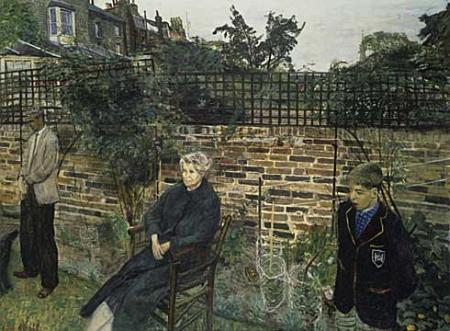
Silence
Carel Weight
_______________________
Kazim Ali interview
Poetry Society of America
Is another part of being "American" this self-orientation toward our own concerns and what happens within our own borders, while still requiring the labor, water, land and mineral resources of every other place in the world? In other words, our material comfort, cultural production, and individual human development and betterment does not rely on any reconfigurement of gender-, race-, class-, or nation-based hierarchies, but actually on an institution of them backed up by American military power (easy when more than 50 cents of every tax dollar goes to support that power), and global political and financial institutions.
(....)
We are a long way from the hoped for definition of "American" we aspire to and still aspire to somewhere in our minds, I believe. So as "American" poets, we do have both versions of America within us, since as citizens of the polity we still do (mostly) benefit from our luck and our willingness to go along, by continuing to elect and support leaders who subscribe to the "American Exceptionalism" doctrine and use U.S. financial and military power to support it.
But we have a chance also, with our language, with the form and focus of our art to begin delineating the truth of our lives as it is and to start imagining on paper and in space the differences we hope to enact.(....)
If the strength of American poetry is its hybrid qualities and leanings, its weakness is also particularly American: its amnesia of history and language, but not a passive amnesia of forgetting, but a brutal and intentional act of erasure: towns and neighborhoods named after plants, animals, and people who no longer exist there. There is a city in Florida called Miami and more than a thousand miles away in Ohio, there is a river called Miami. You have to draw a line between those two places to spell out the word "America."(....)
I think of something Naomi Shihab Nye wrote, in 1999, in her response to the question "What's American About American Poetry?" Nye said, "When I was working overseas on various occasions, poets in other countries would remark that we American poets have a luxury they do not have: we are free to write about tiny "insignificances" any time we want to…We write about personal lives, minor idiosyncrasies, familial details, tomatoes-not feeling burdened to explore larger collective issues all the time, which is something writers elsewhere often consider part of their endless responsibility."
There is a way in which all American life, American writing and poetry included, participates in the historical (and geographical!) amnesia inherent in the concept of "America." What is the responsibility of the writer? When you look one place, there is another place you are not looking. We will have to think for a long time to figure out where we are and who are and what we are doing in this place, thought to be ours from "sea to shining sea," ours by some form of "manifest destiny," some form of "American exceptionalism."...(more)
Kazim Ali
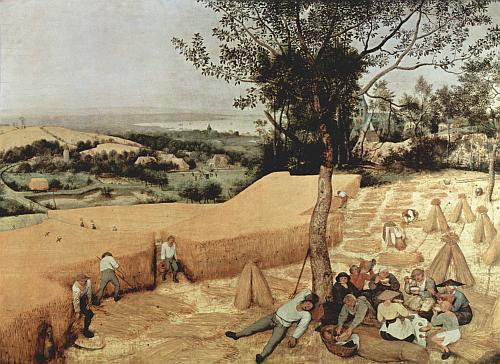
The Corn Harvest
1565
Pieter Bruegel the Elder
d. September 9 1569
_______________________
Grappa in September
Cesare Pavese
The mornings pass clear and deserted
on the river’s banks, fogged over by dawn,
their green darkened, awaiting the sun.
In that last house, still damp, at the edge
of the field, they’re selling tobacco, blackish,
juicy in flavor: its smoke is pale blue.
They also sell grappa, the color of water.
The moment has come when everything stops
to ripen. The trees in the distance are quiet,
growing darker and darker, concealing fruit
that would fall at a touch. The scattered clouds
are pulpy and ripe. On the distant boulevards,
houses are ripening beneath the mild sky.
This early you see only women. Women don’t smoke
and don’t drink, they know only to stop in the sun
to let their bodies grow warm, as if they were fruit.
The air’s raw with this fog, you drink it in sips
like grappa, everything here has a flavor.
Even the river water has swallowed the banks
and steeps them below, in the sky. The streets
are like women, they grow ripe without moving.
This is the time when each person should pause
in the street to see how everything ripens.
There’s even a breeze, it won’t move the clouds,
but it’s enough to carry the blue smoke along
without breaking it: a new flavor passing. And tobacco
is best when steeped in some grappa. That’s why the women
won’t be the only ones enjoying the morning.
Three Poems
Cesare Pavese
Translation by Geoffrey Brock
_______________________

Cesare Pavese
b. September 9, 1908
Cesare Pavese on the Po
Reading Cesare Pavese
John Taylor
Context N°10
"Non scriverò piú." With these solemn words, which mean "I will not write anymore," the Italian novelist, short-story writer, and poet Cesare Pavese (1908-1950) concluded his diary, and killed himself nine days later by taking an overdose of sleeping pills.
Of what is a writer’s suicide emblematic? Of writing’s inability to save a life? Ardent lovers of literature may even find it hard to believe that a talent like Pavese’s could not somehow have kept on producing, plunging anew into the toils of composition as a way of resolving perfunctorily (or at least of putting off) the comparatively minor problems of unrequited love and daily living. But of course I am waxing ironic. It is arresting and, I daresay, grimly informative that Pavese’s extraordinarily lucid and pessimistic diary is entitled Il mestiere di vivere (1952), a book translated into English as This Business of Living and all too significantly emphasizing the "métier" or "trade" of living—as in, say, "Mastering the Trade of Living."
If Pavese failed at this trade, he "successfully"—to mimic his own penchant for implacable ironies—analyzed the failure in his diary, one of the most excruciatingly honest ever composed. This is why the challenge put forward by the title must be kept in mind when reading his stories, as well as the four important novels—The Beach (1942), The House on the Hill (1949), Among Women Only (1949), The Devil in the Hills (1949)—that have been collected in the recently republished Selected Works of Cesare Pavese. As the diary amply reveals, few authors have worked so long with such a heightened awareness of the perilous gap between living and writing. Few writers have so bravely stood astride the chasm, as it were, observing how it widens inexorably, ever awaiting—while continuing to write—the fated moment when they must fall....(more)
This Business Of Living: Diaries, 1935-1950
Cesare Pavese google books
_______________________
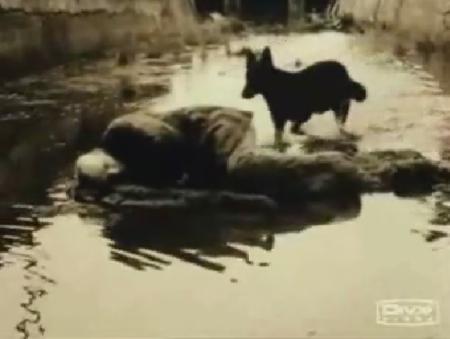
Cesare Pavese - Lavorare stanca
Andrei Tarkovski
youtube
_______________________
Looking Backwards
Timothy Burke
Easily Distracted
... go back into a digitized collection of 19th Century newspapers and the hits vanish. Which might tempt the incautious searcher to conclude that these kinds of tropes and imagery are largely a product of post-1960 global politics or post-1960 racial ideas or post-1960s media environments or some combination of same. And in one sense that's true: when the rhetorical forms and practices change, the ideas themselves change in their meanings, uses and so on. In another sense, it's not true at all: there's a relevant history that keeps going back into the 19th Century, and those digital collections are useful for studying it.
I think this problem is the kind of thing that academic experts need to talk more about if they'd like to promote some critical wariness about the future of knowledge in a digital, crowdsourced age. Absence from search space in many cases is taken as absence from knowledge. (....)
Humanists who are familiar with the sound and feel and cadence of past rhetoric, or with contemporary bodies of speech and representation which are outside of common Wiki’ed reference today, can talk as experts about what happens to a particular set of images or representations when you travel outside of those shared domains of crowdsourced knowledge. But I think we can also teach others to search and read in those unfamiliar spaces when they happen to be digitized. ...(more)
_______________________

Propylées - Athens
c.1889
Adolphe Braun
_______________________
Passion for Solitude
Cesare Pavese
I'm eating a little supper by the bright window.
The room's already dark, the sky's starting to turn.
Outside my door, the quiet roads lead,
after a short walk, to open fields.
I'm eating, watching the sky—who knows
how many women are eating now. My body is calm:
labor dulls all the senses, and dulls women too.
Outside, after supper, the stars will come out to touch
the wide plain of the earth. The stars are alive,
but not worth these cherries, which I'm eating alone.
I look at the sky, know that lights already are shining
among rust-red roofs, noises of people beneath them.
A gulp of my drink, and my body can taste the life
of plants and of rivers. It feels detached from things.
A small dose of silence suffices, and everything's still,
in its true place, just like my body is still.
All things become islands before my senses,
which accept them as a matter of course: a murmur of silence.
All things in this darkness—I can know all of them,
just as I know that blood flows in my veins.
The plain is a great flowing of water through plants,
a supper of all things. Each plant, and each stone,
lives motionlessly. I hear my food feeding my veins
with each living thing that this plain provides.
The night doesn't matter. The square patch of sky
whispers all the loud noises to me, and a small star
struggles in emptiness, far from all foods,
from all houses, alien. It isn't enough for itself,
it needs too many companions. Here in the dark, alone,
my body is calm, it feels it's in charge.
Translated by Geoffrey Brock
_______________________
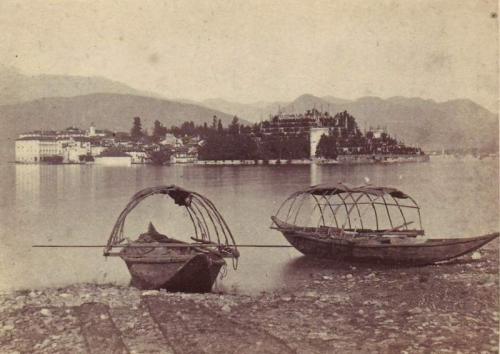
Lac Majeur, Isola Bella
Adolphe Braun
_______________________
The Hawk
Franz Wright
Maybe in a million years
a better form of human
being will come, happier
and more intelligent. A few already
have infiltrated this world and lived
to very much regret it,
I suppose.
(....)
from the sound of those crickets
last night, Rene Char said
prenatal life
must have been sweet -
each voice perhaps also a star
in that night
from which
this time
we won't be
interrupted anymore - but
fellow monsters while we are still here, for one minute, think
about this: there is someone right now who is looking
to you, not Him, for whatever
love still exists.
...(more)
God's Silence Franz Wright google books
_______________________
 1855
Adolphe Braun
1811-1877 Adolphe Braun, another book review
Mrs. Deane
_______________________
End of Fantasy
This body won't start again. Touching his eye sockets
one feels a heap of earth is more alive,
that the earth, even at dawn, does not keep itself so quiet.
But a corpse is the remains of too many awakenings.
We only have this power: to start
each day of life—before the earth,
under a silent sky—waiting for an awakening.
One is amazed by so much drudgery at dawn;
through awakening within awakening a job is done.
But we live only to shudder
at the labor ahead and to awaken the earth one time.
It happens at times. Then it quiets down along with us.
If touching that face the hand would not shake—
if the live hand would feel alive touching it—
if it's true that that cold is only the cold
of the earth, frozen at dawn,
perhaps it'd be an awakening, and things that keep quiet
under the dawn, would speak up again. But my hand
trembles, and of all things resembles a hand
that doesn't move.
At other times waking up at dawn
was a dry pain, a tear of light,
even a deliverance. The stingy word
of the earth was cheerful, for a brief moment,
and to die was to go back there again. Now, the waiting body
is what remains of too many awakenings and doesn't return to the earth.
They don’t even say it, the hardened lips.
Cesare Pavese
translated by Linh Dinh
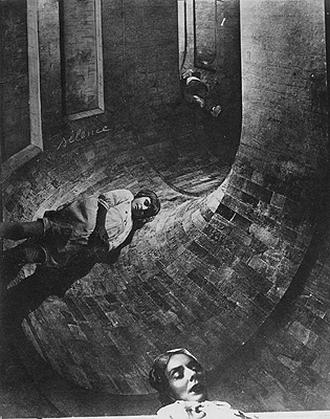
Silence
Dora Maar
1935
_______________________
13 Poems
Georg Trakl
translated from the German by Parker Smathers
Landschaft
September evening; the dark,
sad calls of the shepherds
echoing through the village
at dusk; spray of fire
in the blacksmith’s shop.
A strong black horse rears up;
the hyacinth locks of the maid
catch the ardor of his violet
nostrils.
The cry of a red deer lightly
calcifies at the edge of the woods.
And the yellow flowers of fall
Lean speechless over the blue
countenance of the pond.
A tree burns in leaping flames; the
bats fly off with dark faces. Am Moor
Wanderer in the black wind; lightly
whispers the barren canal
In the stillness of the moor. In the
gray sky
A flock of wild birds follow;
Crossways over the shadowy waters.
Turmoil. In decayed huts
Foulness flutters its black
wings;
Crippled birches sigh in the wind.
Evening at the empty ale house.
The road home surrounded
By the easeful melancholy of grazing herds;
Night appears: Toads come to
the surface of the silver waters.
ACTION YES Online Quarterly
via The Page
_______________________
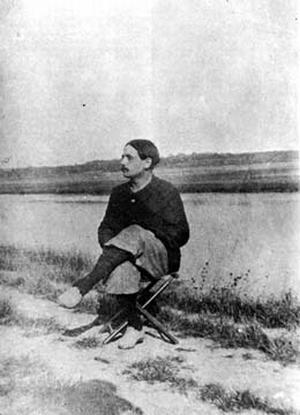
Alfred Jarry
b. September 8, 1873
Ubu Roi
Alfred Jarry
translated by Beverley Keith and G. Legman
google books
Alfred Jarry: Absinthe, Bicycles and Merdre
Dave Walsh
'Ubusing' Culture
Alfred Jarry’s Subversive Poetics in the Almanachs du Pcre Ubu [pdf]
Marieke Dubbelboer
The Passion Considered As An Uphill Bicycle Race
Alfred Jarry
Read it in parallel with J.G. Ballard's story The Assassination of John Fitzgerald Kennedy Considered as a Downhill Motor Race
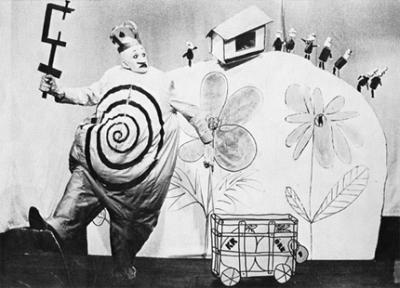
King Ubu
Alfred Jarry
Marionetteatern
1964
Direction: Michael Meschke
© Photo: Beata Bergström
Idle Idols: Alfred Jarry
Mark Sander
An Unrecognized Precursor to Heidegger: Alfred Jarry
Gilles Deleuze
_______________________
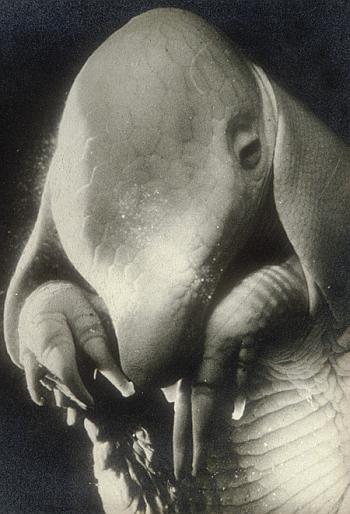
"Pere Ubu"
1936
Dora Maar
1907 - 1997
_______________________
Five Poems
Maxine Chernoff
[without a narrator]
Mr. and Mrs. History
hand in hand
enact the silence
of alternate views
consolation shivers
time dispossessed
patience rewritten on
unchristened ground
in the pageant
the deaths of lovers
disincarnation
in childless space
...(more)
_______________________
Drunken Boat’s 12th issue
_______________________
The Politics of the Gaze Foucault, Lacan and Zizek
Henry Krips
Central to ?i?ek’s account of the modern state is the concept of “an obscenenderside of the law ”, namely widespread practices – petty tax evasion, speeding, walking on the grass, etc – which, although strictly speaking illicit, are unoffi-cially tolerated. This network of practices is sustained thanks to what ?i?ek calls an “ideological phantasy” that keeps them an “open secret” – everyone knows about and participates in them in private, but no one mentions them, let alone pub-licly flaunts participating in them. Such practices constitute points of failure of the law in so far as they fall in an indeterminate zone in relation to legal categories: on the one hand, in so far as they are tolerated they are not straightforwardly ille-gal, but, on the other hand, neither are they legal; and as such, constitute a funda-mental illegality at the heart of the legal system. ?i?ek’s point is that, rather than undermining the law, the obscene underside of the law sustains it – the law is tol- erated because of the little secret pleasures that people derive from its obscene underside. In Lacanian terms, we may say that the obscene underside of the law is the set of necessary but repressed points of failure of the legal system – in short, it is the symptom of the legal system. In particular, in the context of a legal state apparatus that is held in place by a panoptic system of surveillance, the obscene underside of the law is a liminal zone of high anxiety that, like the Emperor’s body under his new clothes, is obscenely visible to each of his subjects in the pri-vacy of their own visual field, yet must be shrouded in a cloak of invisibility in the public realm. This is the site of the gaze.
Culture Unbound, Volume 2, 2010_______________________
Words Without Borders
September 2010: Urdu Fiction from India
_______________________
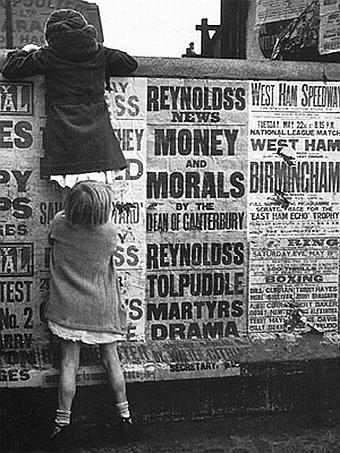
Money and Morals
Dora Maar
1934
_______________________
Bankers, Bookies, and Gamblers
David Korten
globalresearch
_______________________
The Great Divergence:
Trying to understand income inequality, the most profound change in American society in your lifetime.
Timothy Noah
slate
_______________________
A Double Standard in Judgments about the Past
Justin E. H. Smith
(....)I don't want to decide here as between a torture chamber and a hospital, but I do want simply to pause to note the correlation, and possible connection, between the two sorts of double standard. The expectation that our fellow human beings tell it like it is arises together in history with the expectation that they be nice to one another. The chronological upper limit of the exemption that I, and I expect others, allow for saying delirious things about God and angels and spirits and the prophetic power of dreams is roughly the same as the one for raping and pillaging and bludgeoning. If I had to be precise, I would say the boundary lies somewhere around the end of the 15th century (with a good deal of regional variation, and with the non-European world only coming to fall on this side of the historical boundary at the same rate as it is assimilated into the Euro-American global system), and that it is Christopher Columbus who stands as a sort of pioneer of the modern way of being wrong.
Of course the pillaging and unreason go on as before, not just in spite of the Euro-American global system, but just as often in support of it. Modernity then is not really that period when people begin to think and to act differently--i.e., rationally and morally-- but only that period when disapproval of the default way of human thinking and acting --irrationally and brutally-- begins to make sense. ...(more)
_______________________
ESQUE
oetry and ifesto
edited by Amy King and Ana Bozicevic
_______________________
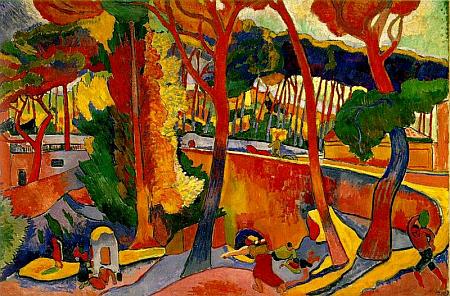
The Turning Road
1906
André Derain
d. September 8, 1954
_______________________
Before The Ice Age
Brad Zellar
Your Man For Fun In Rapidan
The old nights were different,
anchored in a small room crowded
with all it seemed you'd ever
need. A dog in a green chair.
One lamp that gave off nice light.
Answers lined up on one set of shelves;
sounds --answers of a different sort--
huddled together on another.
The black plastic spun all night long,
the miracle of the process a gift
you never took for granted.
The lovely silence as the tone arm
rose slowly and began the graceful
horizontal glide to its cradle.
Then you'd move. Always, though,
a plan for what was next. A list you made
each morning. If there was confusion
it was happy, the warm variety,
open-ended and saturated with wonder.
The static between your ears was then
a kite zagging all night in your skull,
sky writing or just emblazoned with
one thought or idea waiting to be
resolved. Sometimes just a word or image
that would sail so high that you could
no longer make it out and had to let it go.
...(more)
_______________________
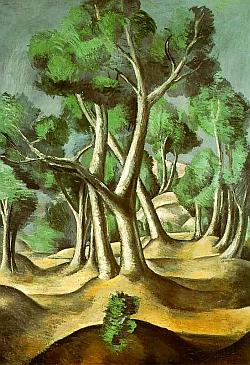
Grove
André Derain
(1912)
_______________________
A Western At The Gates Of Heaven
Kali Yug Express
Claude Pélieu
translated by Mary Beach
courtesy of Pierre Joris
Ink-solitude, gestures freed by patience & panic, the silence displaces a few drops of water, colors stolen from angels and children are reborn on a sprig of syringa.
Never slow down. Never. Hang onto light, like God. Then a wave of maple syrup. “Get off my cloud Shitface!” — you dig anecdotes, they say — in that case, my advice is to travel light. In the end all the nudes did go downstairs. Nostalgic ghosts return to the non-visions that dominate them, when unity exists in their deepest souls. They don’t know how to waste time nor to get stoned, they don’t know how to take the time, nor capture the wind. We’re on earth, among the living, in the heart of the Electronic Democracy, in the Kingdom of the Flower-Age, and we know that Eternity is a big whirling thing. We don=t need to the meaning of a word explained to us....(more)

The Wisconsin Free Library Commission
Wisconsin Historical Society
_______________________
OED bingo
Caleb Crain
Steamboats Are Ruining Everything
Spenser's vocabulary was deliberately archaic even in the sixteenth century, and that's an obstacle. You win quite a few rounds of OED bingo while reading Spenser. (To win a round of OED bingo, a game of my own devising, when you come across a word you don't know, you look it up in the OED, and if you find the same passage that you've been reading among the usage examples, you win. For example, if, like me, you don't know the meaning of stound, then upon discovering the word in a line of Spenser's, you turn to the OED, learn that it refers to a sharp pang, attack, or shock, and just below this definition you find the lines of verse that sent you there:
Then when his deare Duessa heard, and saw
The evill stownd, that daungered her estate . . .
Bingo! I've also won rounds while reading Trollope. Boody, meaning "to sulk," is a word that only Trollope seems ever to have used.)
an aside in Caleb's post - In Despair's cave
_______________________
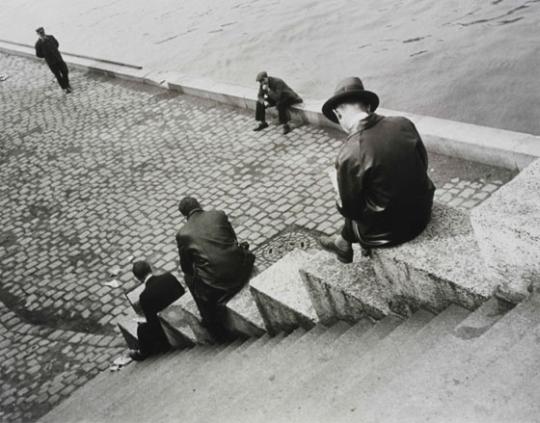
on steps by the Seine, Paris
1931
Ilse Bing
(1899-1998)
1 2
Ilse Bing - Queen of the Leica
Weimar
_______________________
Differentials: Poetry, Poetics and Pedagogy
Marjorie Perloff
ifile pdf - via aaaaaarg
1. Crisis in the humanities?: reconfiguring literary study for the twenty-first century
2. Cunning passages and contrived corridors: rereading Eliot’s “Gerontion”
3. The search for “prime words”: Pound, Duchamp, and the nominalist ethos
4. “But isn’t the same at least the same?”: Wittgenstein on translation
5. “Logocinema of the frontiersman”: Eugene Jolas’s multilingual poetics and its legacies
6. “The silence that is not silence”: acoustic art in Samuel Beckett’s radio plays
7. Language poetry and the lyric subject: Ron Silliman’s Albany, Susan Howe’s Buffalo
8. After language poetry: innovation and its theoretical discontents
9. The invention of “concrete prose”: Haroldo de Campos’s Galaxias and after
10. Songs of the earth Ronald Johnson’s verbivocovisuals
11. The Oulipo factor : the procedural poetics of Christian Bok and Caroline Bergvall
12. Filling the space with trace: Tom Raworth’s “Letters from Yaddo”
13. Teaching the “new” poetries: the case of Rae Armantrout
14. Writing poetry/writing about poetry: some problems of affiliation
_______________________
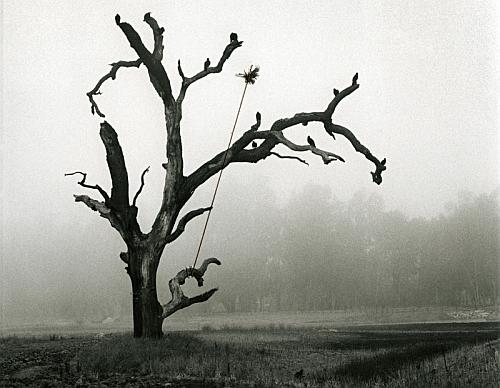
Vulture Roost
(Tethered Tearers)
After Ascension and Descent
Charles Grogg
_______________________
... on the other, there’s a couple of septaugenarian billionaires who’ve decided in their wisdom to poison the none-too-healthy political discourse of the United States, skirting genocidal levels of ethnic hatred; to pillage and loot the remnants of the vibrant middle class that was this country’s finest achievement, the whole point of all that hullabaloo of freedom and liberty; to repeat until we all can’t help but say ourselves: we can no longer afford to take care of the things we’ve built, the art we love, the friends and relations too old, too ill, unlucky at just the wrong time; they’ve coldly plotted, these two, the murder of millions if not billions or people yet to come, just as any supervillain might; they decree that my daughter and your son must live lives so much smaller than they possibly could have been, so much meaner than they potentially could be—and all because these two men in some abstract sense feel they are not making enough money, here and now; in some abstract sense (which no doubt they could explain to you at some length, with charts and diagrams), they feel they pay too much in taxes.
Kip Manley
Long story; short pier
_______________________
Harper's Party: The curious case of the missing conservatives
James Laxer
rabble
Harper’s bazaar is inhabited by enthusiasts from the Christian Right, anti-government devotees, advocates of economic and political union with the United States, opponents of abortion, people fearful of gay pride festivities, haters of trade unions, those who think you should be nice to everyone who is not different, lobbyists for the oil industry, and those who fear that global warming is a pointy-headed conspiracy. Binding them together is a proverb: To those who have much, more shall be given; to those who have not, less is only plenty.
Missing in this potpourri are conservatives. Traditional conservatives are not frightened of the state. They don’t fear the census, and they don’t believe that registering cars, or guns is step one on the way to the shadowy men in the black helicopters swooping down and taking our shotguns away. They don’t think that someday those with four-wheel drive vehicles may have to take up arms against the state.
They didn’t support the original Tea Party in which white men dressed up as native people threw tea into Boston Harbour; and they don’t support today’s Tea Party, financed by billionaires, and dedicated to the proposition that ignorance is a qualification for political leadership. They are inclined to the view that the state should control the means of violence and do not adhere to the notion that the Second Amendment of the U.S. Constitution(that the U.S. Supreme Court interprets as giving Americans the right to bear arms) is the fount of liberty. ...(more)
_______________________
Today Christians ... stand at the head of [this country]... I pledge that I never will tie myself to parties who want to destroy Christianity .. We want to fill our culture again with the Christian spirit ... We want to burn out all the recent immoral developments in literature, in the theater, and in the press - in short, we want to burn out the poison of immorality which has entered into our whole life and culture as a result of liberal excess during the past ... (few) years.
-
Adolf Hitler, quoted in: The Speeches of Adolf Hitler, 1922-1939, Vol. 1 (London, Oxford University Press, 1942), pg. 871-872 found here
_______________________

Coffee seller, late 19th c.
Damascus anno
Poemas del rko Wang
_______________________
The Reading Experience - the book
Daniel Green
... a selection of the posts that most directly state and develop the concerns I consistently explored over the course of the blog's existence, edited, rearranged, and supplemented with some new content. It is not simply a collection of posts, nor a "greatest hits" selection, but, as I say in the preface, is the book I might have written had I not created the weblog instead.
available in several formats as Dan switches to The Reading Experience 2.0
_______________________

Traveling Library Station
1897
The Wisconsin Free Library Commission
Wisconsin Historical Images
Wisconsin Historical Society
_______________________
"The Sorrow of Being"
Nicola Masciandaro
mediafire pdf - via aaaaaarg
Let us stray, then, into the place where sorrow and definition perfectly meet, purely intersect. This place would be at once an absolutely sorrowful definition and an absolutely definitional sorrow, the site of a definition of sorrow so sorrowful that it provides the one who understands it with a sorrow defining their very being, a sorrow, in other words, that coincides with one.s understanding of its definition so purely as to constitute self-understanding. In light of the what/that distinction, this definition can only be fulfilled by a sorrow that is simultaneously a kind of empty or contentless or undetermined sorrow, a sorrow over a pure that, and a sorrow over an absolute what, a something so unmistakably unfortunate, so plenitudinously negative, that it cannot be countermanded from any outside or external perspective, by no god or emperor. Only thus will we arrive at the intersection of a most sorrowful definition and a most definitional sorrow, the definition of a sorrow our sorrow for which gives us the sorrow it defines as our own being, in short, a sorrow as inconceivable as it is inconsolable, a sorrow of being. _______________________
Spurious on Quotes
(....)To break with one's gods, with one's ancestors, with one's language and one's country, to break tout court, is a terrible ordeal, that is certain; but it is also an exacting one, avidly sought by the defector and, even more, by the traitor.
(....)
Melancholy redeems this universe, and yet it is melancholy that separates us from it.
(....)
Of all things one feels, nothing gives the impression of being at the very heart of truth so much as fits of unaccountable despair; compared to these, everything seems frivolous, debased, lacking in substance and interest.
To read is to let someone else work for you - the most delicate form of exploitation.
When I think of him now, I still believe he was really someone; of all the inhabitants of the village, he alone had enough imagination to ruin his life.
-
E. M. Cioran, Anathemas and Admirations

Summer Night,
1886
Eilif Peterssen
b. September 4, 1852
_______________________
Garden graft
Mari Mörö
Translated by Lola Rogers
books from finland
A garden often functions as a calendar, a sort of an open, illustrated diary for those who work it. I maintain that for many older people the garden also stimulates the memory. The aesthetic experience that surrounds us in the garden arouses the senses, anchors images in our minds, calms and delights us, enlivens and makes whole again things that we thought we had lost. Memories are carved out of places, people, and things. People want to carry these things with them, as part of their identity. They don’t weigh us down at all, yet there is nothing more weighty. The moment we lose them, we lose ourselves. An inherited garden, passed down in the family, is a rare thing. It may be in the muscle memories of numerous generations, and that is really something. If you have the privilege of taking care of such an inherited garden, it can function for future generations not just as a garden, but also a bit like poems that the gardener has hidden away here and there. Each person will interpret it in their own way, though there are always those for whom such a poem holds no interest. When I see a bulldozer and builder’s booth in a fine, old garden, I’m overcome with an inexpressible sadness, even though there may be a good reason for it – serious matters like real estate sales, new apartments or roads. When an old garden goes, more than one garden is nullified.
A worker at the dump once told me what the saddest sight in the world is: photo albums in the trash. So many homeless memories that no one has time to grieve an individual photograph.
Plants don’t grieve, they generally grow where they are planted, or else they stop growing. They don’t remember us, but we remember them. New life will come to take their place, whether we like it or not.
I’m sitting in the evening on the largest stone in my garden, on Derelict Hill. There are so many mole tunnels that I wouldn’t wonder if the stone disappeared into the earth and took this green-thumb with it. I guess that would stay in my muscle memory, too....(more)
_______________________
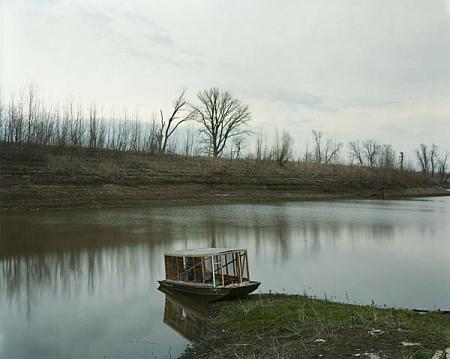
Saint Genevieve
Sleeping By The Mississippi
Alec Soth
Dismantling My Career: A Conversation with Alec Soth
Bartholomew Ryan
The Walker Art Center
Alec Soth:
These last couple of years have been about taking apart everything I know—Broken Manual. The reason it’s broken has a lot to do with the fact that I can’t escape all these outside pressures. It did start as this commission, but then I started dismantling the project.
Just yesterday I was doing an online interview. One of the questions was: “What’s the project that has the most meaning for you?” And if I were just going to answer off the top of my head, it would be Sleeping by the Mississippi because there’s just nothing like that first time where you don’t know what you’re doing. You’re neck-deep into the work. What I’ve been trying to get back to—and in a funny way, what I am now at this moment getting back to—is that newness.(....)
BR:
In 2004 you were nominated to the Magnum photographic cooperative and have since become a full member.<3> As a fine-art photographer, what was it about this institution, which is traditionally for photojournalists, that attracted you?
AS:
I’m just never comfortable in the art world, because it doesn’t exactly exist in Minnesota. Of course, we have museums, we have this and that. But the heart of it in the United States is New York and Los Angeles. I’m not exactly comfortable in it, and I don’t believe in every element of it. I always felt that I had to have a job. Magnum is a way to work with legendary photographers. It’s a way to expand my career in different directions. So it was like, boom! You’re dropped down in this assignment; you have no idea how to do it. But you have to produce something, and it’s going to get published, and thousands of people are going to see it. And that was all really exciting. A lot of that has worn off now. I mean, it was fun, but also that industry has changed dramatically, just in the last year.
If you say, “I am a photographer,” what you are doing is aligning yourself with the technology. And that is what’s problematic about it, particularly because the technology has just been changing relentlessly. I came to Magnum in this odd way—I use really old technology, which is not that applicable to photojournalism, but because of my credibility in the art world, I get jobs. Gilles Peress, a photojournalist at Magnum, one of the great thinkers about all of this, often says, “If I have to hang the picture in your bedroom and show it to you that way, I’ll do it that way.” There’s a bit of that for me. This high/low stuff . . . not worrying so much about it. I want to make stuff, and I want other people to experience it. That’s the biggest thing.
via Idiotic Hat
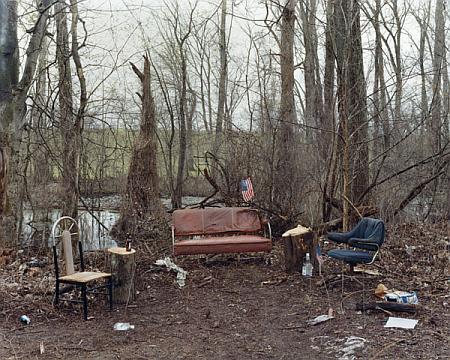
Luxora, Arkansas
Sleeping By The Mississippi
Alec Soth
_______________________
The order of things
Bob Hicok
Then I stopped hearing from you. Then I thought
I was Beethoven's cochlear implant. Then I listened
to deafness. Then I tacked a whisper
to the bulletin board. Then I liked dandelions
best in their afro stage. Then a breeze
held their soft beauty for ransom. Then no one
throws a Molotov cocktail better
than a buddhist monk. Then the abstractions
built a tree fort. ......(more)
Conduit
via the page
_______________________
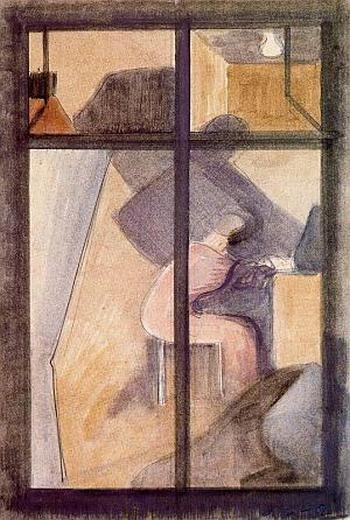
Oskar Schlemmer
b. September 4, 1888
.....................................................
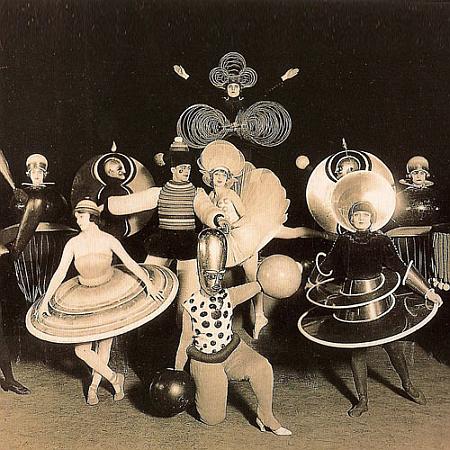
Triadic Ballet
Oskar Schlemmer
(1927)
Orbiting in abstraction: the dances of Oskar Schlemmer
Anna Sutton
_______________________
... we in the West are not the only people in the world. Not long ago a friend who had been in Zimbabwe told me about a village where people had not eaten for three days, but they were still talking about books and how to get them, about education.(....)
We are a jaded lot, we in our threatened world. We are good for irony and even cynicism. Some words and ideas we hardly use, so worn out have they become. But we may want to restore some words that have lost their potency.
We have a treasure-house of literature, going back to the Egyptians, the Greeks, the Romans. It is all there, this wealth of literature, to be discovered again and again by whoever is lucky enough to come upon it. A treasure. Suppose it did not exist. How impoverished, how empty we would be.
We own a legacy of languages, poems, histories, and it is not one that will ever be exhausted. It is there, always.
We have a bequest of stories, tales from the old storytellers, some of whose names we know, but some not. The storytellers go back and back, to a clearing in the forest where a great fire burns, and the old shamans dance and sing, for our heritage of stories began in fire, magic, the spirit world. And that is where it is held, today.
Doris Lessing
Nobel Lecture
December 7, 2007
riley dog
_______________________
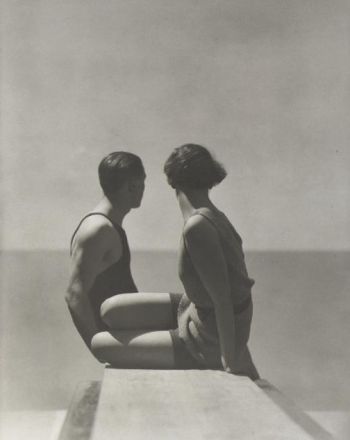
Divers
Swimwear by Izod
1930
George Hoyningen-Huene
b. September 4, 1900
_______________________
The Uprooted
Chronicling the Great Migration
Jill Lepore
newyorker
At its peak, the W.P.A.’s Federal Writers’ Project employed more than six thousand
writers—from newspaper reporters to playwrights, anybody who used to make some kind of living by writing and couldn’t anymore—including Saul Bellow, Zora Neale Hurston, John Cheever, and Richard Wright. (At the time, one in four people in publishing was out of work.) It was mired in bureaucracy and inefficiency, you had to take a pauper’s oath to get hired, and the whole thing was axed, four years after it got started, by people in Congress who were convinced it was a Communist front. But, before that, Ellison and all those thousands of other writers chronicled American life by interviewing ordinary people.
They also reinvented the interview and changed American journalism forever....(more)
_______________________
This promises to be the worst Labor Day in the memory of most Americans. Organized labor is down to about 7 percent of the private work force. Members of non-organized labor — most of the rest of us — are unemployed, underemployed or underwater.
... the real problem has to do with the structure of the economy, not the business cycle.
- Robert B. Reich
_______________________
 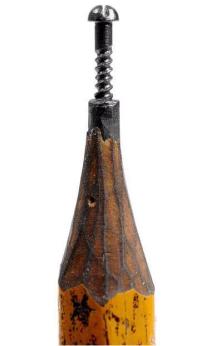 
Finding the Art in a Pencil Tip
nyt
Dalton Ghetti
A Bad Guide
_______________________
Silent Television
A Virtual History of Voice and Voicelessness in Divergent Media
Robert Briggs
What would it mean, then, to propose a history of an inconceivable phenomenon? And what would be the implications of such a history for understanding the complex of technologies, political-economic structures and cultural practices that we more regularly refer to as "television"? Insofar as its apparent impossibility is regularly tied to the medium's defining characteristics, the inconceivability of silent television, as soon as it is identified as such, presents a challenge to any form of criticism that aspires to address the distinctness of television as a cultural form. For despite its apparent inconceivability, references to this unimaginable phenomenon have been made on a number of occasions -- not least of all in the negations of it proposed by Zettl and by Chion -- and so the unthinkability of silent television may turn out to be not so much fundamental as it is virtual. To pursue an unlikely history of a virtual impossibility -- to write a history, not of silent television as such, but rather of the thought of its apparent im/plausibility -- need not, therefore, be confined to an exploration of television's most general features. In that regard, it is perhaps not irrelevant that the "impossible" thought of silent television should resurface at a time when television's identity is being made over by the development of "new" media and by the related momentum of media and cultural "convergence," which are together presumed to give TV audiences the voice that broadcast television has historically denied them. When the question of television's identity is thus already being asked (as it were) at the practical level of its "everyday" use, the foundations are in place to approach the history of "silent television" with an eye to the fact of television's divergence -- attending to the ways in which television diverges from "itself" as much as from the regularities that define our entrenched perceptions of other, related media. It is by way of the metonymic case of televisual silence, therefore, that the following discussion proposes to reflect on a complex of issues pertaining to the variable relations between television, sound, art and cultural participation. ...(more)
_______________________
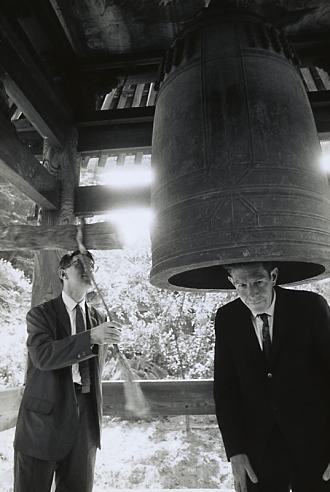 John Cage
b. September 5, 1912
"I have nothing to say
and I am saying it
and that is poetry
as I needed it"
-
John Cage
The Music of Verbal Space: John Cage's "What You Say"
Marjorie Perloff
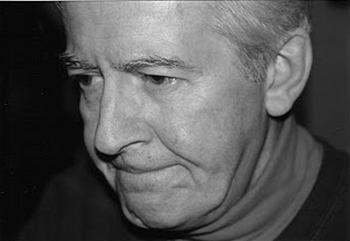
John Newlove
1938 - 2003
Poem with Ravens
John Newlove
From: Apology for Absence: Selected Poems 1962-1992
Dease Lake to Watson Lake
November 1985
And with a penetrating silence
and with solitary gestures,
an oil drum among the pines,
and with good gravel roads
and with an understanding of itself
that is not to be understood
and with pines
and with cheeseburgers
and with mock log cabins
and with real ones
and with an acceptance of the inside world
that is to be understood
and is not solitary or a gesture
and with an understanding of light
and with pines and pines
refusing to leave home,
one bowing gracefully like a geisha,
and with comfortable immensities
and with a quiet pride kidding the outsiders
gently and gently and gently and gently
and with pines and with pride
and, yes, with snow, we must mention snow
where colour itself seems a type of wealth
and with danger and with pines
and with serenity and with calmness
and with pines and with pines and with pines
and with humans, always with humans ....
.....................................................
17 seconds
( : a journal of poetry and poetics )
edited by rob mclennan
Conversations with John Newlove [pdf]
Carla Comellini
_______________________
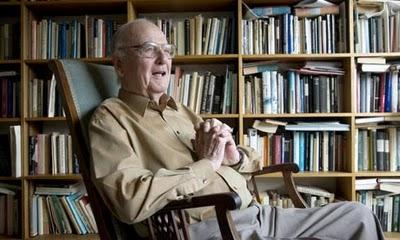
Frank Kermode
(29 November 1919 - 17 August 2010 )
Photograph: Fabio De Paola.
Eliot and the Shudder
Frank Kermode
TLS, 13 May 2010
I have almost successfully avoided that word ‘hit’, but here it is used by a poet who attributed high importance to that first
early moment which is unique, of shock and surprise, even of terror … a moment which can never be forgotten, but which is never repeated integrally; and yet which would become destitute of significance if it did not survive in a larger whole of experience; which survives inside a deeper and a calmer feeling. The majority of poems one outgrows and outlives, as one outgrows and outlives the majority of human passions: Dante’s is one of those which one can only just hope to grow up to at the end of life.
This is a fine tribute not only to the verse that caused the hit that causes the shudder, but to the wholeness that is required for its accommodation.
I suppose that in the nature of the case, when the poets concerned are of the highest powers, there will be moments at which some but not all will experience the frisson. Such a passage is the one about Brunetto. Those lines must be known to pretty well the entire educated public in Italy. This is important because extreme familiarity can preclude the shudder, rather as ‘Tomorrow and tomorrow and tomorrow’, for us, shrinks to a proverb. We need a touch of mystery.
(....)
Shakespeare himself doesn’t make much use of words like ‘shudder’ and ‘shuddering’. Not surprisingly Timon needs one of them, and another occurs, in Portia’s mouth, in The Merchant of Venice. Yet all of us know by the hits we have experienced or endured that there are passages that possess extraordinary power to surprise and to ‘make one’s flesh creep with sincerity’. Let me take a final example from The Winter’s Tale, a work of enormous rhetorical and linguistic range. The repentant Leontes is tormented by faint and presumably deceptive signs of life in the supposed statue of his dead wife, until he says: ‘Still methinks/There is an air comes from her. What fine chisel/Could ever yet cut breath?’ However fine the workman, statues cannot be made to breathe; but we nevertheless experience this marvellous intermediate phase when stone is magically refined to breath and the revelation of Hermione’s living presence, another even greater miracle, will follow....(more)
_______________________
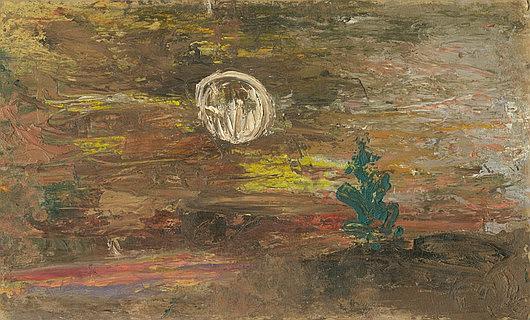
moonscape
The Paintings of E. E. Cummings
as freedom is a breakfastfood
E. E. Cummings
d. September 3, 1962
as freedom is a breakfastfood
or truth can live with right and wrong
or molehills are from mountains made
-long enough and just so long
will being pay the rent of seem
and genius please the talentgang
and water most encourage flame
as hatracks into peachtrees grow
or hopes dance best on bald men's hair
and every finger is a toe
and any courage is a fear
-long enough and just so long
will the impure think all things pure
and hornets wail by children stung
or as the seeing are the blind
and robins never welcome spring
nor flatfolk prove their world is round
nor dingsters die at break of dong
and common's rare and millstones float
-long enough and just so long
tomorrow will not be too late
worms are the words but joy's the voice
down shall go which and up come who
breasts will be breasts and thighs will be thighs
deeds cannot dream what dreams can do
-time is a tree (this life one leaf)
but love is the sky and i am for you
just so long and long enough
_______________________
Chicken-with-its-head-cut-off-ism
Luno explores the border between induction and existentialism in this critique of analytical philosophy.
phlogma
(....)
Philosophy is massive, deep, and rich in species, even if we confine ourselves to just Western philosophy. I would study it in all its varieties if I could live long enough. The Varieties of Philosophical Experience (following James) would be a nice book to write that I know I never will. As it is, I only know a fair amount about analytical philosophy. But without claiming any expertise outside that school, my oldest and deepest deepest sympathies remain with the early “existentialists.” Perhaps because those things closest to my heart are delicate, and being perhaps a little intellectually clumsy, I have felt that I could break nothing important by doing analytical philosophy. Analytical philosophers are at their best demolishing things. And the very best ones undermine even their own modest aspirations.
I want to address here the virtues and limitations of the philosophy I know best. And I want to do it in the analytic style because I am most comfortable with it. That means I am going to move slowly and deliberately in parsing a simple problem and with as much clarity and precision as I can muster. I will start out with a very familiar problem to analytical philosophers and show how it leads to an impasse that can only be traversed if we open our minds to ways of thinking about the human world that assume there are other virtues than those so dear to analytical philosophers—others, that is, than clarity of terms and precision in argument. And I will argue the choice not to attempt to traverse the impasse is not an option with intellectual integrity. Those who shirk the responsibility are either lacking seriously as philosophers or as human beings....(more)
_______________________
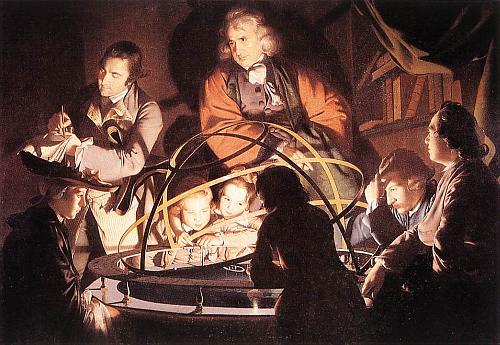
A Philosopher Lecturing
with a Mechanical Planetary
1766
Joseph Wright of Derby
b. September 3, 1734
_______________________
A Renaissance of Wonder
Steve Silberman
NeuroTribes
Who launches a blog in 2010?
In my case, the answer is someone who had one in 1997, before the term “weblog” even existed. Back then, I was the first full-time writer at Wired News. Web pages had only recently evolved out of the primordial ooze of gray backgrounds and blink tags. Though it seems absurd to contemplate, when I joined Wired magazine’s website HotWired (now Wired.com) in 1995, the idea that you could employ the Internet to publish articles every day, or even several times a day, was still new and radical. Coming from the mindset of a monthly magazine, trying to design and put out a new “issue” once a week seemed ambitious. (We called my proto-blog a “column,” and the awkward term “webzine” was still in circulation.)
How quickly the world has changed; and I’m happy to report, for the better, in many ways. ...(more)
PLoS BlogsDiverse perspectives on science and medicine The public library of sciencevia Somatosphere
_______________________
I too am aware of the trunk that stretches loathsomely back of me along the floor. I too am a many-visaged thing that has climbed upward out of the dark of endless leaf falls, and has slunk, furred, through the glitter of blue glacial nights. I, the professor trembling absurdly on the platform with my book and spectacles, am the single philosophical animal. I am the unfolding worm, and mud fish, the weird tree of Igdrasil shaping itself endlessly out of darkness toward the light.
-
Loren Eiseley (September 3, 1907 – July 9, 1977), The Firmament of Time
Searching for Loren Eiseley:
An Attempt at Reconstruction from a Few Fragments
Gene V Glass
No matter how much one might see in Eiseley's work, in the end to call it "mystical" is faint-hearted, a withholding of comprehension, perhaps even a staunching of an emotional response. One wishes to bar from conscious experience the unwelcome thoughts of death and love that Eiseley evokes with tangible objects and common actions. Mysticism is that which can not be rationally grasped; a work deemed mystical need not be fully apprehended and may be forgotten more easily. In this respect, an attitude toward literature may imitate an attitude toward dreams. A dreamer may transform his dreams into psychodrama or pick through them in search of archetypes and residue of the collective unconscious of the race; both routes bypass the terror of the dream, the terror that justifies the work of disguise that is characteristic of many dreams and some art. The inclination of mind that too quickly relegates either a dream or work of art to the category of mysticism may fail to understand either.
I wish most to dispell any notion that Eiseley was some sort of cosmic guru, a seer with eyes trained on the empty darkness beyond the solar system about which he wrote so much. He was a scientist with a poet's gifts. As he grew older, his scholarly writings grew more evocative and poetic, and he dared to publish more poetry. He died in 1977, less than two months short of his seventieth birthday; in 1975, he published an autobiography, All the Strange Hours. For twenty years, Eiseley had been digging at the site of his past life. In a poem or an essay, he would uncover a bone, regard it contemplatively, then toss it aside. In All the Strange Hours, he excavated an entire life. To understand Eiseley's writings, they must be read in reverse sequence. The autobiography is the key to the images and reflections that make up his ten books and few hundred poems. Eiseley's autobiography is easily one the most psychologically penetrating works to be published in a generation. It is built out of the reflections of an insomniac, from the recollections and night thoughts that come to a melancholic after the television set is shut off and the night grows too late for friends to telephone....(more)
Returning Insight to Storytelling: Science, Stories, and Loren Eiseley
Jason Sanford storySouth
Sunflower Forest, A Loren Eiseley Reader
All the Strange Hours: The Excavation of a LifeLoren Eiseley google books_______________________
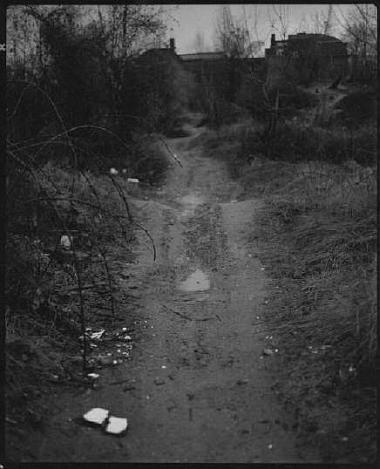
Behind the Japenses embassy
Köbisstr.
1989
John Gossage
Stephen Daiter Gallery
viaTim Atherton
_______________________
A LONG CONTINUAL ARGUMENT WITH MYSELF
As if human beings only lived one moment at a time!
– no past, no future; as if a part of the pain
of receiving that simple act of kindness
were not the memory of it occurring before –
as if there were nothing to hope for
when a stranger woman smiles and kisses you
at someone else’s kitchen door, as if
that tree of gratitude for humans would not bloom again –
which will:
silver in the silver sun.
A Long Continual Argument: The Selected Poems of John Newlove
edited by Robert McTavish
Chaudiere Books
_______________________
Blog This Rock
The blog of Split This Rock Poetry Festival: Poems of Provocation & Witness
Poem of the Week
Race Change Operation:
Thomas Sayers Ellis
From Skin Inc. (Graywolf Press 2010)
When I awake I will be white, the color of law.
I will be new, clean, good; and as pure as snow.
I will remember "being black" the way one
experiences deja vu, as shadow-memory-feeling.
Race will return to its original association with running
and winning, though I will never have to do either
(ever again) to prove myself Olympic, human or equal.
My English, by fault of gaze (theirs), will upgrade.
I will call my Mama, Mother and my Bruh, Brother
and, as cultural-life-insurance, the gatekeepers will
amputate my verbal nouns and double-descriptives.
When I grow my hair long I will favor Walt Whitman
more than Wole Soyinka. My pale, red neck will scare me,
a frightening irony of freedom. The Literary Party in power
will adopt me, saying "TSE is proof of our commitment
to (verse) diversity...." I am. Narrative poets will use me
as long as they can trust me, and Elliptical women
will want me in their anthologies but not as a colleague.
What will I do with myself other than prove myself,
my whiteness, and that blackness is behind me?
The poetry in my walk will become prose.
I will be a white fiction full of black-ish progression,
the first human bestseller, a Jigga Book Spook.
It will be like having tenure, my value will be done.
This is crazy, this lose-a-world way to whiteness.
...(more)
via Philip Metres
_______________________
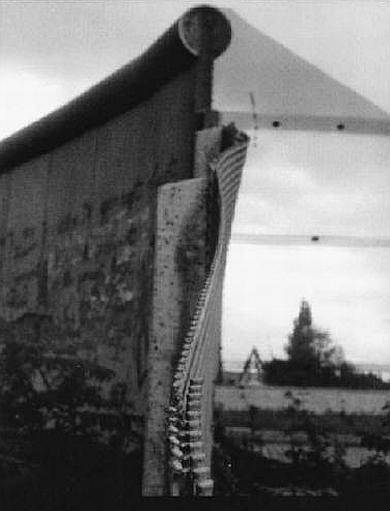
Kielerstr.
John Gossage
1987
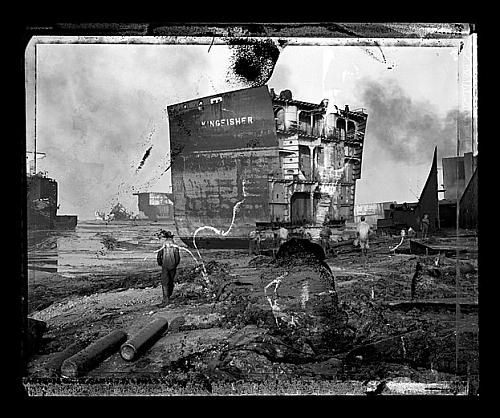
Shipbreaking #24
Field Proof
Chittagong, Bangladesh, 2000
Pentimento
Edward Burtynsky
_______________________
Samuel Greenberg: American Poet
Memory
Samuel Greenberg
(1893 - 1917)
Gluttonious helium of thoughts endowment,
What piercing awe Hast thou Bestowed!
O Lantern of unvieled standing glow!
Upon my sensations, wooed remorseless
Shadows peal! and yet can'st Hover
O'er retentions beat, through
Forgetful saints of Natures comedie's
Crest, have bent their solemn
Woes of lifes domain 'Pon real joy
But thence slumBer woke their
Earnest ties, and bright learning hope
O tender guise, sweet from soul's
Wanton gift, Hath poured the
Simple ways in profound vital thrift --
Samuel Greenberg’s Braided Secrets
Camille Martin Samuel Greenberg & Grammatic Truth
Charles Bernstein
The Glass Bubles
Samuel Greenberg
The motion of gathering loops of Water
Must either Burst – or remain in a moment
The violet colours Through the glass
Throw up – little swellings that appear
And spatter – as soon as another strikes
And is Born – so pure are they of coloured
Hues that we feel the absent strength of
its power – when they Begin – they gather
Like sand on the Beach – each buble
Contains a complete eye of water.
_______________________
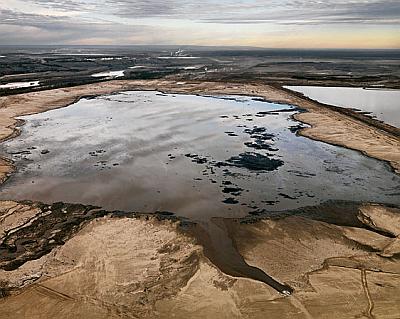
Alberta Oil Sands
Fort McMurray, Alberta, 2007
Oil
Edward Burtynsky
thanks to junk for code for the reminder
_______________________
One Lump Or Two?
James Howard Kunstler
Fox News entertainer, former drug addict, and professional weeper Glenn Beck took center stage at the Lincoln Memorial exactly forty-seven years to the day after Martin Luther King's "I Have a Dream" speech for a rally dedicated to "restoring honor," which is tea party code for the otherwise unutterable idea: get that nigger out of the White House! (despite the attendance of a few African-American shills on the scene).
Eighty-seven thousand disoriented citizens lined the DC Mall reflecting pool and adjoining lawns to witness Beck overstep his role as a television clown and don the mantle of an evangelist-savior battling the dark forces working insidiously to put the America of WalMart, Walt Disney World, Nascar, and Burger King into the Collapsed Society Hall of Fame -- where it's heading anyway, due to the bad choices these self-same citizens made during an extraordinary bonanza era of cheap oil that is now drawing to a close whether anyone likes it or not. Naturally, Beck invoked prayer against this prospect, which is what people resort to when they don't understand what is happening to them.(....)
The bigger mystery in all this -- if I may perhaps engage in some nostalgia of my own -- is: what happened to reasonable, rational, educated people of purpose in this country to drive them into such burrow of cowardice that they can't speak the truth, or act decisively, or even defend themselves against such a host of vicious morons in a time of troubles?...(more)
Once Upon a Time, in America…
The right has one fundamental advantage over its opponents: storytelling.
Michael Atkinson
Not so long ago, in a typical conniption fit, Glenn Beck blubbered to his TV audience about the loss of America’s greatness. No one faklempts like Beck, and on this October evening he was very moist. He was mourning the America best represented, he thought, by several 1970s network TV ads, including one for Kodak (children, butterflies) and one for Coke (game-losing Mean Joe Green accepting a conciliatory cola from a grade-school boy). Beck whined and moaned and waxed reactionary, choking back saline, pleading with us to remember “what life used to be like!” and “how it felt!”
It was not an unusual performance. Watching the clip is like watching a clinical video of a beleaguered schizophrenic.
Beck seems aware that his constituency has lost the capacity to discern TV fantasy from what’s real. And we can overlook, for now, the fact that if America “used to be united!” as he cried, it was united over unchallenged racism, women’s subjugation and the presumption of a white president.
The substance of Beck & Co.’s discourse is odious trash, of course. But the question remains why it has gained such audience share. Theories abound, most of them unkind to a big chunk of American voters. But watch Beck spin a fable about the glory days of America by way of something as transparently disingenuous as a TV commercial, and you begin to see the structural trump card—story....(more)
_______________________
... neither Obama, Bush, nor the Pentagon will ever admit the deepest wound we have inflicted on our best and brightest. It is one thing to say a war is difficult and cost billions - it is not going well - it may not be won. It is quite another to admit to over 1.5 million volunteer soldiers as over 400,000 have already filed medical claims, that there was no mission, except to come home.(....)
Until we can look our soldiers in the eye and tell them what they already know better than anyone else - that there was no mission - how can we genuinely welcome them home or expect them to heal?
-
Patricia Foulkrod
_______________________
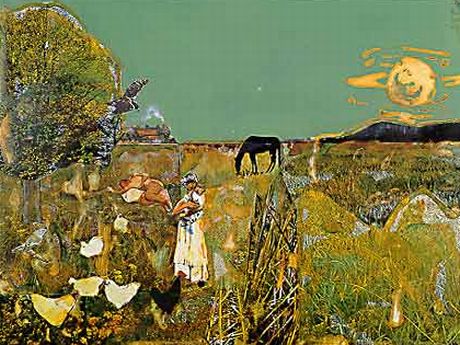
Sunset Limited
1975
Romare Bearden
b. September 2, 1911
_______________________
Rethinking Borders, Violence, and Space
Julie Mostov
Social Science Research Network
Abstract:
The paper I am proposing draws on my earlier analysis of hard borders, violence, fluid identities and political space. Given our contemporary landscapes of mobility and immobility, failing sovereigns and competing ethnocrats, new global actors, and modes interaction, we need to be rethinking our notions of political association beyond container states and fixed territorial spaces. The practices of fixing identities into differential political statuses and arbitrary geographic borders are particularly dangerous as responses to “crises.” While many pundits suggest that it is the lack of defined or secure borders that encourages violent conflicts, facilitates terror-bent incursions, and tempts traffickers to defy border guards, I argue that it is the proliferation of hard borders (symbolic, legal, and material walls, fences, and frontiers) that incites violence, provides mechanisms for domination, and undermines opportunities for peaceful and sustainable political association. In the face of “hard times,” this is not a utopian argument for world government, but an attempt to rethink the relationship of borders, violence, and space.
This paper draws on my earlier interrogation of traditional notions of sovereignty in the context of ongoing processes of fragmentation and integration and my concern that the linkage of citizenship to nationality in this context exposes many individuals to conditions of extreme vulnerability and violence. Using the theme of crises to frame moments of conflict, multiple strains, uncertainty, and vulnerability in symbolic and physical borderlands, the paper will attempt to pose both the dangerous securitizing pressures to close and harden borders and the liberating possibilities of fluidity and malleability, opening and softening of borders. Softening borders undermines the construction of power relations around fixed definitions of difference and institutionalized practices of domination and violence. While the instinct toward closure is often built into narratives of “hard times” and the language of crisis; I hope to offer resistance to this turn through both an analysis of moments of crisis and a re-thinking of borders, violence, and space.
_______________________

Oil Spill
Edward Burtynsky
_______________________
Crooked Wood, Straight Timber – Kant, Development and Nature
Rafael Ziegler
Due to the complexity of history, the possibility of a theory of development seems unlikely; due to wars and catastrophes a theory of development may not be desirable. It could serve as a legitimizing tool for “a set of practices, sometimes appearing to conflict with one another, which require – for the reproduction of society – the general transformation and destruction of the natural environment and of social relations” (as Gilbert Rist puts it in his History of Development (2006)). And yet, in spite of many and repeated criticisms, development has remained a widely used political concept. The often instrumental use of the concept in the context of economic growth and asymmetrical North-South relations suggests the task of continued conceptual clarification.
This paper investigates Kant’s contribution to this task via an examination of his writings
on cosmopolitanism and history ...
Public Reason: Vol. 2, No. 1, June 2010
_______________________
Excerpt (from a narrative in progress)
Gregory Vincent St Thomasino
nthposition
Cathy says the circus is a metaphor for hell.
I say tell me, then, what of the magician? The magician is an old Portuguese, or maybe he's Brazilian. He knows the words for happy smile and children. His hands are the hands of a cobbler, thick and rough and long healed over. There are salt stains covering his shoes, and speckling the cuffs of his trousers. The knees of his trousers are worn, and woven over in circles. There is a painted ocarina, strung on leather 'round his neck, with an image of the Virgin Mother stenciled just below the lip, about the size of a thumb print.
The magician holds up six black squares, each square about the size of a Christmas card, and assembles them into a box. He then opens the lid and up pops the head of a bunny. He takes the bunny by its ears and hides it away inside his overcoat. He blows a note on his holy ocarina, stops to wipe the spittle from his lip, and breaks off into cough. ...(more)
_______________________
From Think Tank
Julie Carr
conjunctions
(....)
And narrative illusion breaks down metaleptically
transforming expectations of early and late.
A man walks into the ground.
Has now made “his” what is simultaneously “not his.”
Run to the seawater, seawater boiling.
The lobby of the library,
harmonizing and gay.
Not by concrete but by owl-light
we sing.
...(more)
Julie Carr 1 2 3 4 5
Sarah--Of Fragments and Lines
Julie Carr Coffee House Press
100 Notes on Violence
Julie Carr Ahsahta Press
_______________________
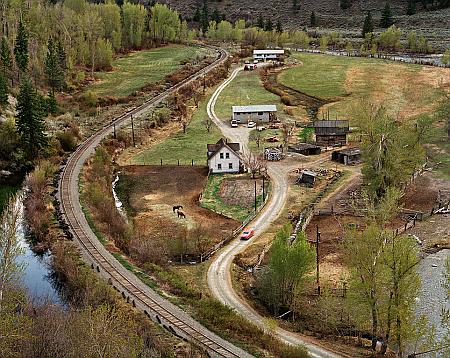
Homesteads #32
View from Highway 8,
British Columbia 1985
Toronto, Ontario
Edward Burtynsky
_______________________
Claude Pélieu : KALI YUG EXPRESS
Translated by Mary Beach
courtesy of Pierre Joris
(....)
WRITTEN AND ERASED IN THE FRISCO SKY
A bit of eternity in the pink window.
Blond mountains riddled with poppies and corn-flowers.
(Stones swallow our tears, a lava flow transforms the landscape, on its high heels a tidal wave ravages the West Coast)… we chew our cud in the shade of tall trees, high on the mesa, a smell of burnt toast invades the universe. The stars dance… raisins, nuts, almonds… the wind rips the pages of newspapers and mini skirts… perfume and pearls travel faster than light. Everything quivers in the Velvet Bay, the Illumination Cobalt Blue Bay — paprika accompanies the wind, Cosmic Drag, Donald Duck fucks Mona Lisa, the Masked Lobster sodomizes J. Edgar Hoover — void dances in the margin, sparks rob the Cold Bank… robots impose a violent censorship, and on the blue screen a beautiful flesh-storm, gusts of screams and prayers… gongs and tambourines, we’re in the blue jungle and we risked all for an orange girl with a boy’s ass. The automatic pilot writes in the sky FADED SMOKE, drifting… flood of alcohol… acid hasn’t been outlawed yet… crazy television sets, skulls stuffed with multicolored sausages… some say that it’s still too early and roll in greyness, the others arm themselves, to hear and see nothing.
Paradise lost? The fluorescent city’s arms roll on the screen, twisted, broken, they’re the streets and the old films oxidize the young years, flesh cracks as a sign of mourning.
I’m speaking from very far away from today, and from the depths of the 50s and 60s, upside down, in the middle of undecipherable mutations....(more)
_______________________
Formless: A User's Guide
Yve-Alain Bois
iflie pdf - via aaaaarg
Although it is more than sixty years since Georges Bataille undertook his philosophical development of the term informe, only in recent years has the idea of the "formless" been deployed in the theorizing and reconfiguring of twentieth-century art. In Formless: A User's Guide, Yve-Alain Bois and Rosalind Krauss present a rich and compelling panorama of the formless. They chart its persistence within a history of modernism that has always repressed it in the interest of privileging formal mastery, and they assess its destiny within current artistic production. In the domain of practice, they analyze it as an operational tool, the structural cunning of which has repeatedly been suppressed in the service of a thematics of art. Neither theme nor form, formless is, as Bataille himself expressed it, a "job." The job of Formless: A User's Guide is to explore the power of the informe. A stunning new map of twentieth-century art emerges from this reconceptualization and from the brilliantly original analyses of the work of Jackson Pollock, Andy Warhol, Cy Twombly, Lucio Fontana, Cindy Sherman, Claes Oldenburg, Jean Dubuffet, Robert Smithson, and Gordon Matta-Clark, among others.
_______________________
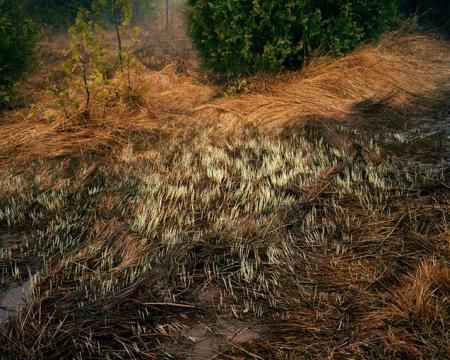
Grasses, Bruce Peninsula
1981
Early Landscapes
Edward Burtynsky
Nicholas Metivier Gallery
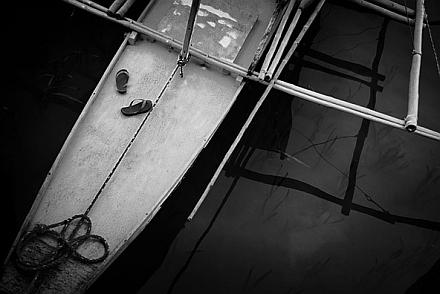
Memories
Estan Cabigas
_______________________
Paradigm of the Tinctures
Poems
Steve McCaffery
Images
Alan Halsey
free ebook via Argotist Ebooks.
the figure: viewed from the back
It’s the other side of Summer
in a blown-up world
behind it there’s Caspar David Friedrich
copying the paintings
of Old Masters, sturm und drang with
a pair of scissors for comfort.
What a splendid air of security!
The writing that knows the lovers of strange landscape
is hardly visible,
shivers to the shape of
a disappearing allegorical vocabulary.
Let’s go there and be read
in a morning fog
ask a tree to dance with us
in the sentence
“I have to stay alone.”
.....................................................
Alan Halsey interviewed by Gregory Vincent St. Thomasino
E·ratio
Has poetics become too philosophical? Too political? How do you deal with this in your poetry, or are you indifferent (immune?) to it all. . . ?
I can’t remember when I last read a book on poetics. In the 70s and 80s I did read Barthes, Foucault, Derrida and related work, and I’m sure you could trace the use I made of that and perhaps still do as a kind of background. But the philosophy which I consciously dwell on is what I learnt as an undergraduate a decade before, the Presocratics, Hume, Philosophical Investigations. The Presocratics for the impacted fragment, Hume for sceptical good nature, Wittgenstein for his attention to language as it goes about its business. That’s what I was trying to acknowledge when I wrote ‘Wittgenstein’s Devil’ although that poem is also a response to Steve McCaffery’s writing. Steve has much more enthusiasm for critical theory and contemporary philosophy than I have, at the same time as we share a number of preoccupations—that poem of mine is driven by the similarities and differences.
Does poetry still matter? Is it still worth the investment? One is liable to devote a whole lifetime to poetry, a whole lifetime to the study of it, we become, some of us, and in our various ways, scholars of our tradition . . . is it worth it any more?
We’re talking about poetry because it still matters to us and maybe a few hundred people of our acquaintance. I admit I’m less convinced now than I used to be that it can be made to matter or even be much noticed in the big wide world. Perhaps it will, we can’t know that, must just do what we do and want to do. ‘Literature’ in current parlance practically always means the novel, and usually novels of largely narrative interest not striving for any intensity of language—the very thing for which we read poetry is somehow regarded as off the scale of common appeal. I’m depressed by that, and even more when I find the same low intensity in poetry itself. ...(more)
.....................................................
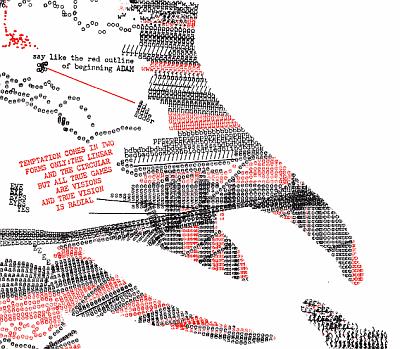
Carnival
Steve McCaffery
typewriter concrete poetry
Steve McCaffery at EPC and PennSound
Sound Poetry - A Survey
Steve McCaffery
From Sound Poetry: A Catalogue, edited by Steve McCaffery and bpNichol, Underwich Editions, Toronto, 1978
.....................................................
Canadian Alternative Poetry Online
ditch
Poetries of Canada
The East Village Poetry Web
Volume Four
Canadian Strange
a folio of contemporary Canadian arts & letters
Drunken Boat 2006
_______________________
Do Not Bring a Tree into the House
Dennis DiClaudio
Exquisite Corpse
Yes, Hypatia was dragged from her carriage and pulled into the Caesareum. She was stripped naked. She was flayed with sharpened tiles and beaten and killed. Yes. Her body was carved into pieces and then burnt on a pyre in the Cinaron. It was a painful and cruel death, yes, but do not bring a tree into the house. Trees belong outside, where their roots can grow downward into the earth, where their limbs can reach upward toward the sky, where birds can make their nests in their branches and wearied travelers can rest beneath the shade of their leaves. And though it was a party of Nitrian monks, good Christians, who sharpened their ostrakois against rocks and waited for Hypatia's carriage to pass, we cannot help but view this event with some concern....(more)
_______________________

(I want those eggs)
Florentina
Illustrations by Hana Stepanova
A Journey Round My Skull
_______________________
Reconstructing the Story of the Storm: Hurricane Katrina at Five
Rebecca Solnit
Truth may be the first casualty of war; it's certainly the most important equipment to have on hand in a disaster. There's the practical truth about what's going on: Is the city on fire? Is there an evacuation effort on the other side of town? And then there's the larger truth: What goes on in disasters? Who falls apart and who behaves well? Whom should you trust? Most ordinary people behave remarkably well when their city is ripped apart by disaster. They did in San Francisco after the 1906 earthquake; in New Orleans during Hurricane Betsy in 1965; in Mexico City after the 1985 earthquake; in New York City in the aftermath of 9/11; and in most disasters in most times and places.
Those in power, on the other hand, often run amok. They did in San Francisco in 1906, when an obsessive fear that private property would be misappropriated led to the mayor's shoot-to-kill proclamation; a massive military and national guard on the streets; and the death of dozens, perhaps hundreds, of civilians. Much like New Orleans ninety-nine years later, those who claimed to be protecting society were themselves the ones who were terrorizing and shooting. Earlier this year, Haitians were subjected to a similar rampage of what the disaster sociologists Lee Clarke and Caron Chess call "elite panic." For example, 15-year-old Fabienne Cherisma was shot to death in late January in Port-au-Prince for taking some small paintings from a shop in ruins, one of many casualties of the institutional obsession with protecting property instead of rescuing the trapped, the suffering and the needy.
Surviving the new era, in which climate change is already causing more, and more intense, disasters, means being prepared—with the truth. The truth is that in a disaster, ordinary people behave well overall; your chances of surviving a major disaster depend in part on the health and strength of your society going into it. Even so, countless individuals under corrupt governments, in New Orleans, in Mexico City, in Port-au-Prince, often rise to the occasion with deeply altruistic, creative and brave responses. These are the norm. The savagery of elite panic is the exception, but one that costs lives.(....)
The very subject of recovery is a complicated one for New Orleans. After 9/11 New York pretty much wanted to get back to where it had been—a thriving, functioning city (albeit one with plenty of poverty and injustice). No one thought New Orleans should get back to what it had been, and the disaster became an opportunity for the city to reinvent itself in various ways. That process continues, and where it goes is anyone's guess. It still depends on the dedication of volunteers and citizens, some of whom are returning, putting their lives back together in what may be, by some intangible measures of joy and belonging, America's richest city, even if it's the poorest by others.
A disaster unfolds a little like a revolution. No one is in charge, and anything is possible. The efforts of elites, often portrayed as rescue or protection, are often geared more toward preserving the status quo or seizing power. Sometimes they win; sometimes they don't. Katrina brought many kinds of destruction and a little rebirth, including the spread of green construction projects, new community organizations and perhaps soon, thanks to the work of Thompson and others, some long overdue justice for police crimes. It's too soon to tell what it will all mean in a hundred years, but it's high time to start telling the real story of what happened in those terrible first days and weeks....(more)
via Jim Johnson
_______________________
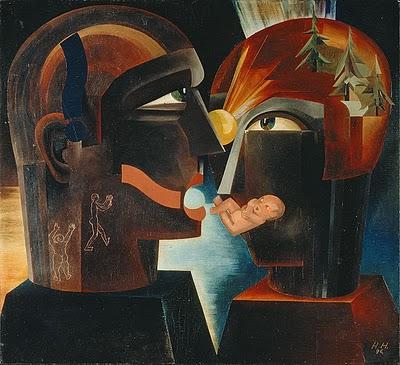
Imaginary Bride
Hannah Höch
1926
Hannah Höch - Brushflurlets and Beer Bellies
Weimar
Art and Modernity in Central Europe
_______________________
Tan Lin
Electronic Poetry Center
from lingo 6
Tan Lin
The Imitation of the Imitation of History
1
It means an envelope of conversation appears
on a map,
and is stationary
like the whim between.
2
In a cartoon, a hat expands
When it is a pasture,
2 1/2 2 5/7 2 11/16
memory pries open the usual,
melodious vials of instruction, semi-acoustical
vowels, the anti-romanticism
3
accustomed to linger on porches. Ecouter et parler,
4
blowing doe-eyed lavender shoes in wind weighed like macaroni.
5
thus, you are my lips glued to the ocean.
6
Like a coupon facing a mirror,
the computer enters the moon's tendencies,
...(more)
Heath (Plagiarism/Outsource),[Pdf] Notes Towards The Definition Of Culture, Untilted Heath Ledger Project, A History Of The Search Engine, Disco Os,
_______________________

The New Cathedrals
Estan Cabigas
via Joerg Colberg
_______________________
Spurious quotes from from Cioran, All Gall is Divided, translated by Richard Howard
In other times, the philosopher who did not write but thought incurred no scorn thereby; ever since we began prostrating ourselves before the effective, the work has become the absolute of vulgarity; those who produce none are regarded as failures. But such failures would have been the sages of another age; they will redeem ours by having left no traces.
Boredom is a larval anxiety; depression, a dreamy hatred.
Sooner or later, each desire must encounter its lassitude: its truth ...
Awareness of time: assault on time ...
Erect I make a resolution; prone I revoke it.
Our disgusts? - Detours of the disgust with ourselves.
...(more)
|
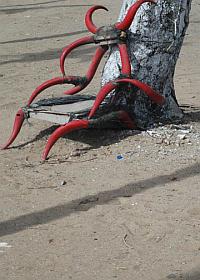
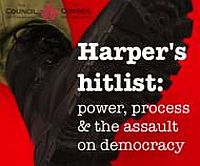
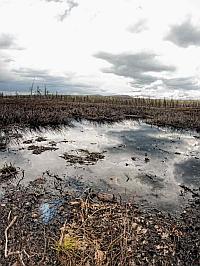
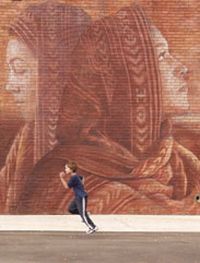 Janus Head
Janus Head

 The Age of Briggs & Stratton
The Age of Briggs & Stratton



























































